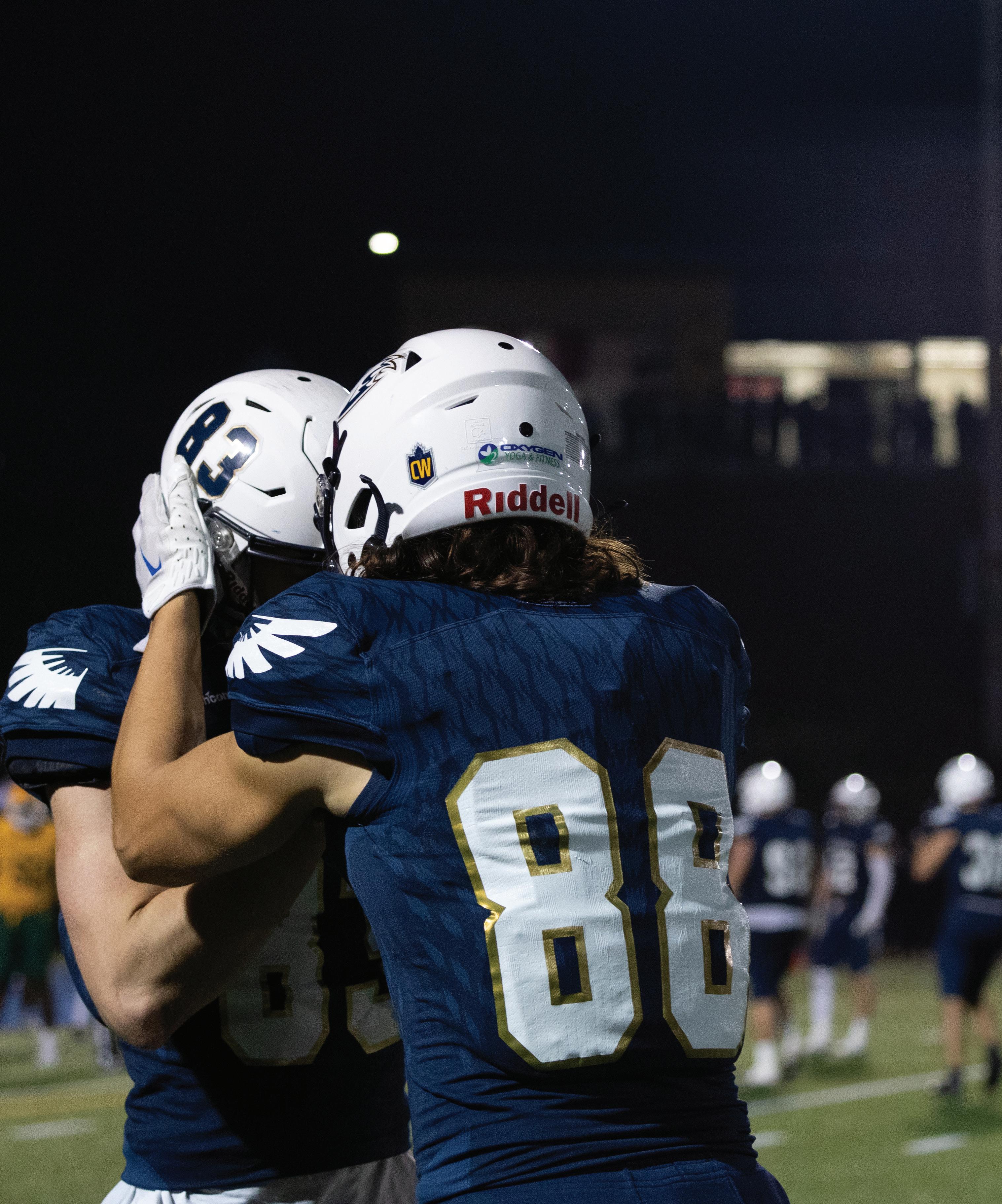
03 NEWS SEPTEMBER 12, 2023 | VOLUME CV | ISSUE VII CEREBRALLY INVOLVED SINCE 1918 Rallying for status and climate 08 09 10 FEATURES Abul Bashar Rahman bikes for climate stories OPINION Barriers to mental healthcare persist HUMOUR The stages of post add/drop grief 06 CULTURE ARTIVISM embraces resistance ‘BIRDS VICTORIOUS AT HOMECOMING / 14–15 THE UBYSSEY U
EDITORIAL BUSINESS
Coordinating Editor Anabella McElroy coordinating@ubyssey.ca
News Editor Aisha Chaudhry news@ubyssey.ca
News Producer Renée Rochefort news@ubyssey.ca
Culture Editor Elena Massing culture@ubyssey.ca
Features Editor Iman Janmohamed features@ubyssey.ca
Opinion Editor Spencer Izen opinion@ubyssey.ca
Humour Editor Jocelyn Baker humour@ubyssey.ca
Science Editor Tova Gaster science@ubyssey.ca
Sports + Rec Editor Lauren Kasowski sports@ubyssey.ca
Visuals Editor Anya A Ameen visuals@ubyssey.ca
Photo Editor Isa You photo@ubyssey.ca
Video Producer Ravnoop Badesha video@ubyssey.ca
WHERE THE HEART IS
Winnipeg lies at the heart of the country
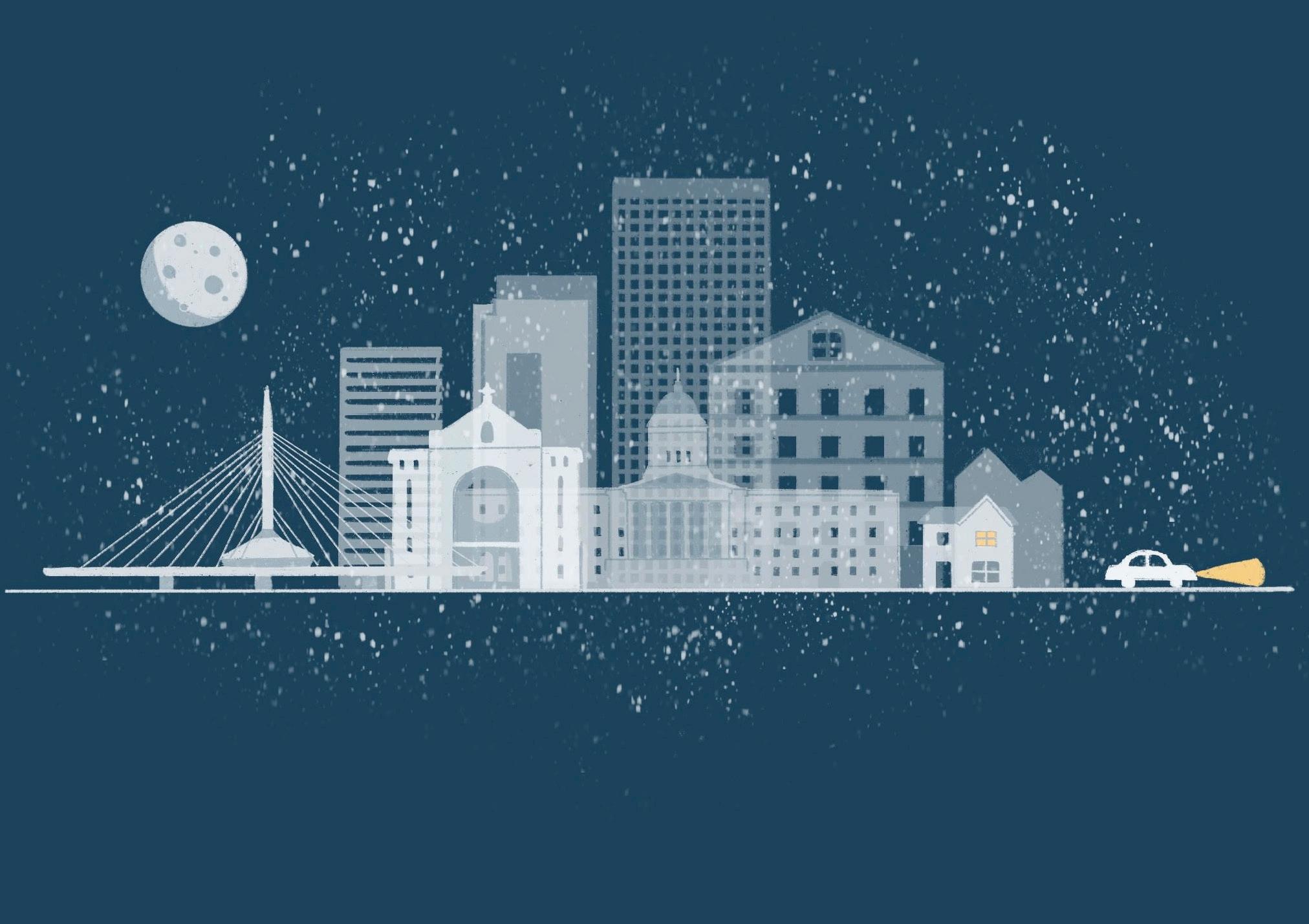
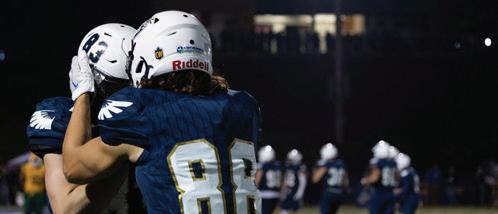
Business Manager Douglas Baird business@ubyssey.ca
Account Manager Scott Atkinson advertising@ubyssey.ca
Web Developer Brittany Sampson b.sampson@ubyssey.ca
Web Developer Sam Low samuellow@ubyssey.ca
Web Developer Akshanjay Kompelli akshanjaykompelli@ubyssey.ca
Social Media Manager Jasmine Le social@ubyssey.ca
President Jalen Bachra president@ubyssey.ca
CONTACT
Editorial Office: NEST 2208 604.283.2023
Business Office: NEST 2209 604.283.2024
6133 University Blvd. Vancouver, BC V6T 1Z1
Website: ubyssey.ca
Twitter: @ubyssey
Instagram: @ubyssey
Facebook: @ubyssey
TikTok: @ubyssey
On the flight from Vancouver to Winnipeg, I kept my eyes trained out the window the whole way home.
Over the course of three hours, the mountainous terrain and Pacific blue of the West Coast soften steadily into rolling hills, then wear away into the flat rushing fields of the Prairies.
stock Canadian city, in Saskatchewan or maybe Ontario. It didn’t matter where we were, just that we had finally arrived.
I spent a lot of time as a kid wishing I could live somewhere more exciting. I wanted to pack up and leave Winnipeg at the first possible moment. I think I spent so much time doing this that I usually never miss Winnipeg at all, even after leaving. Except for the winters.
Winter in the Prairies compresses time and space into one straight line. Low-rise commercial buildings and warehouses cling to an even lower horizon. While Vancouver spends its winter months steeped in a gray drizzly fog, everything here pierces — the snow is brilliant and white, and the expanse of hard cloudless sky hovers closely above. It’s hard to breathe and hard to see, the sun flooding everything fluorescent.
LAND ACKNOWLEDGEMENT
We wish to acknowledge that we work, learn and operate the paper upon the occupied, traditional, ancestral and unceded territory of the Coast Salish peoples, including the xʷməθkʷəyəm (Musqueam), Sḵwxwú7mesh (Squamish), Stó:lō and səli lwətaɁɬ/Selilwitulh (Tsleil-Waututh).
The Ubyssey is the official student newspaper of the University of British Columbia (UBC). It is published every second Tuesday by the Ubyssey Publications Society (UPS). We are an autonomous, democratically-run student organization and all students are encouraged to participate. Editorials are written by The Ubyssey’s editorial board and they do not necessarily reflect the views of the UPS or UBC. All editorial content appearing in The Ubyssey is the property of the UPS. Stories, opinions, photographs and artwork contained herein cannot be reproduced without the expressed, written permission of the Ubyssey Publications Society. The Ubyssey is a founding member of Canadian University Press (CUP) and adheres to CUP’s guiding principles.
The Ubyssey accepts opinion articles on any topic related to UBC and/or topics relevant to students attending UBC. Submissions must be written by UBC students, professors, alumni or those in a suitable position (as determined by the opinion editor) to speak on UBC-related matters. Submissions must not contain racism,
sexism, homophobia, transphobia, harassment or discrimination. Authors and/or submissions will not be precluded from publication based solely on association with particular ideologies or subject matter that some may find objectionable. Approval for publication is, however, dependent on the quality of the argument and The Ubyssey editorial board’s judgment of appropriate content. Submissions may be sent by email to opinion@ ubyssey.ca. Please include your student number or other proof of identification. Anonymous submissions will be accepted on extremely rare occasions. Requests for anonymity will be granted upon agreement from four-fifths of the editorial board. Full opinions policy may be found at ubyssey. ca/pages/submit-an-opinion
It is agreed by all persons placing display or classified advertising that if the UPS fails to publish an advertisement or if an error in the ad occurs the liability of the UPS will not be greater than the price paid for the ad. The UPS shall not be responsible for slight changes or typographical errors that do not lessen the value or the impact of the ads.
Manitoba has always struck me as the nation’s middle child. It’s often passed over in the family of provinces, seemingly lacking the natural beauty of British Columbia, the culture of Quebec, the charm of the Maritimes or the commerce of Ontario. We are amiably self-aware of this lack, with our license plates sporting “Friendly Manitoba.” It even acts out like a middle child would, swinging wildly between seasonal temperatures, rocketing up to 30°C in the summers and later plummeting to -40°C in the winters.
Winnipeg lies at the heart of the country.
My family moved to Winnipeg when I was seven — another family leaving their homes to start again in what seemed like an isolated tundra. We subscribed to all the Filipino things available to us in Canada: church, any bakery with good pandesal and other Filipinos.
“Don’t forget where you come from,” recited my parents over and over again. “We came to Canada for a better life, but don’t forget where you came from.”
Winnipeg, incidental and nondescript, blurred for us through this mantra. Its particular details didn’t matter, only the nebulous golden dream of “Canada” did — we could have lived in any other

Like clockwork every September, I start to miss the cold, and every December, I fly back to see my parents. When they pick me up, they come armed with a thick parka and turon — warm and sticky fried banana rolls — in a paper bag.
My parents downsized the house and moved to a new suburb on the edge of town. Now, the drive back is long and is spent treading over icy streets and catching me up on the tsismis.
I listen and eat in the back seat of the car, laughing as they recite the names of people I grew up with in a tangled list of who’s getting married, who’s having kids, who’s in debt. They point out the new businesses and the failing ones. They drive by the old church, my old school and our old house. I finish one roll of turon and start on another, cracking into a caramelized shell to reveal a golden stripe of banana, carefully sliced and set. I feel sick with gratitude and too much sugar.
We think our hometowns stop for us when we leave them, like pressing pause on a movie. Instead, the scenes move quickly, and the future materializes without us. Suddenly, I am grown up, sitting in a parked car in front of our old house. Christmas lights twinkle from the rooftop and two kids play inside. It’s snowing.
But despite the brutal elements, the city seems to draw power from the cold, clean air. Wintertime in the city is when it is at its most proud, its most eccentric, its most miraculous. Winnipeggers will scoff at you for wearing a parka when it’s -10°C and will wear flip-flops and fold-out lawn chairs in 5°C. The city’s rivers, the Red and the Assiniboine, freeze over, ribboning throughout the city to make a huge outdoor skating trail. It’s where everyone I grew up with learned to ice skate, falling down in huge ski pants and licking cinnamon sugar off our lips from the donuts. Some weekends, it felt like we were all there together, all the city’s people streaming down a gleaming silvery path.
On my last day, my parents drove me down to the airport. I kissed them goodbye and promised to call.
As the plane takes off over my hometown, I peer out at the city blanketed in white, the only gaps carved through by roads and rivers. I watch until Winnipeg floats silently out of my periphery. I press pause on the movie, knowing that it will all shift again.
I know it is only a matter of time until next December, until the next call of the snow — the reminder to come back to the heart of the country, the centre of everything. U
ON THE COVER HOMETOWN RAMBLINGS PAGE 2 2 SEPTEMBER 26, 2023 TUESDAY
ULEGAL SEPTEMBER 26, 2023 | VOLUME CV | ISSUE VII THE UBYSSEY The Ubyssey periodically receives grants from the
of Canada to fund web development and summer editorial positions.
Government
COVER ISA YOU
STAFF
Bernice Wong, Isabella Ma, Kyla Flynn, Manya Malhotra, Nathan Bawaan, Stella Griffin, Zoe Wagner
BESSIE
Manitoba has always struck me as the nation’s middle child.
GUO / THE UBYSSEY
Nicola Roscuata Contributor
Migrant rights advocates organize rally as part of national call for justice
Isabelle Dina Contributor
On September 17, Migrant Students United (MSU) at UBC rallied for Status For All at the Canada Border Services Agency, alongside other migrants rights groups like Sulong UBC, MSU at SFU, Migrante BC, Committee for Domestics’ Workers and Caregivers’ Rights and Gabriela BC.
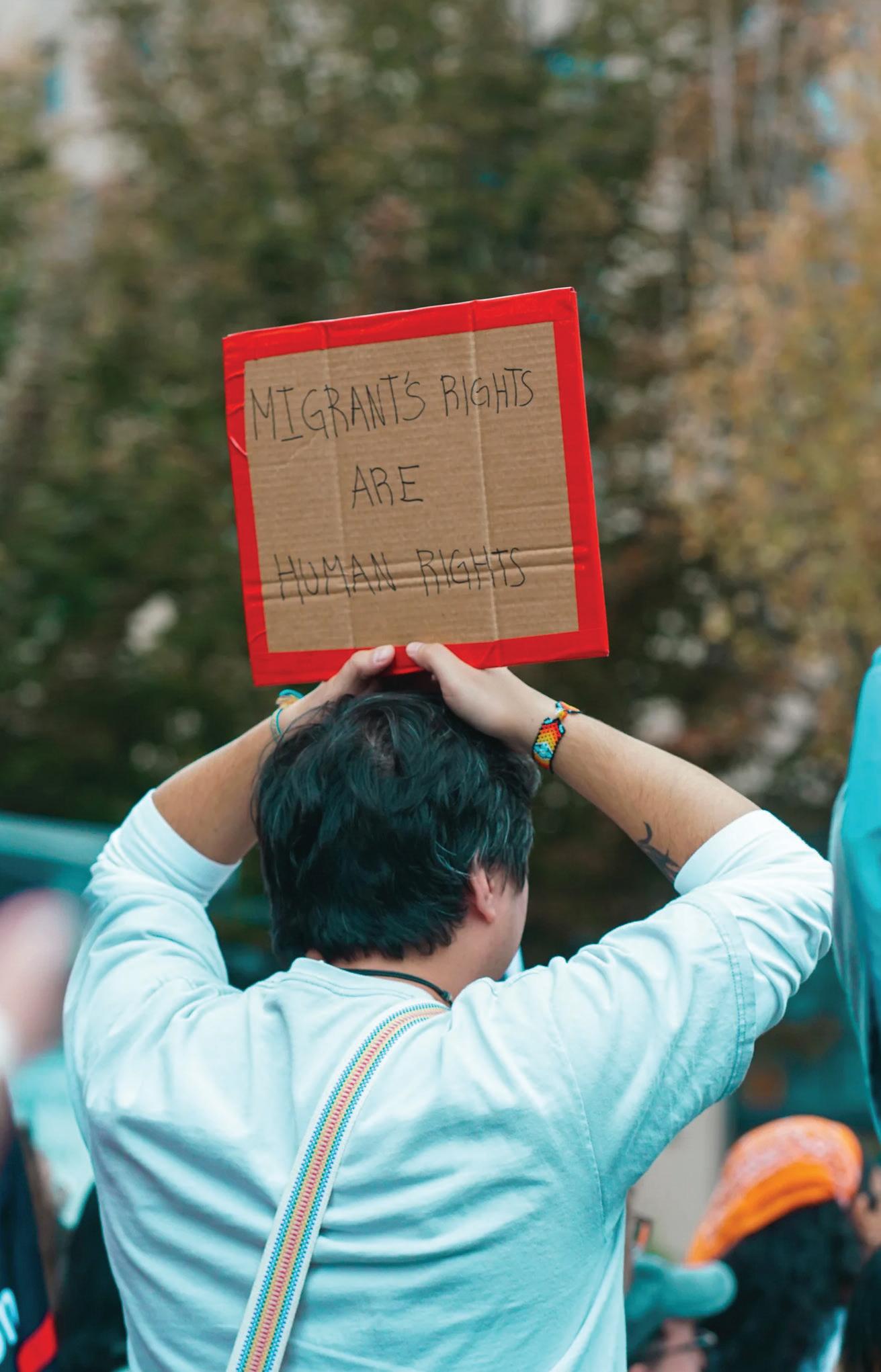
The event began with a series of chants, “Health Care for All Now,” “Stop Deportation Now” and “Landed Status Now.”
The Vancouver rally coincided with sister rallies occurring all across Canada to fight for migrant justice. The “Status for All” movement is not a new one, and is led by the Migrant Rights Network. Status For All is a demand for all migrants to gain documentation as permanent residents.
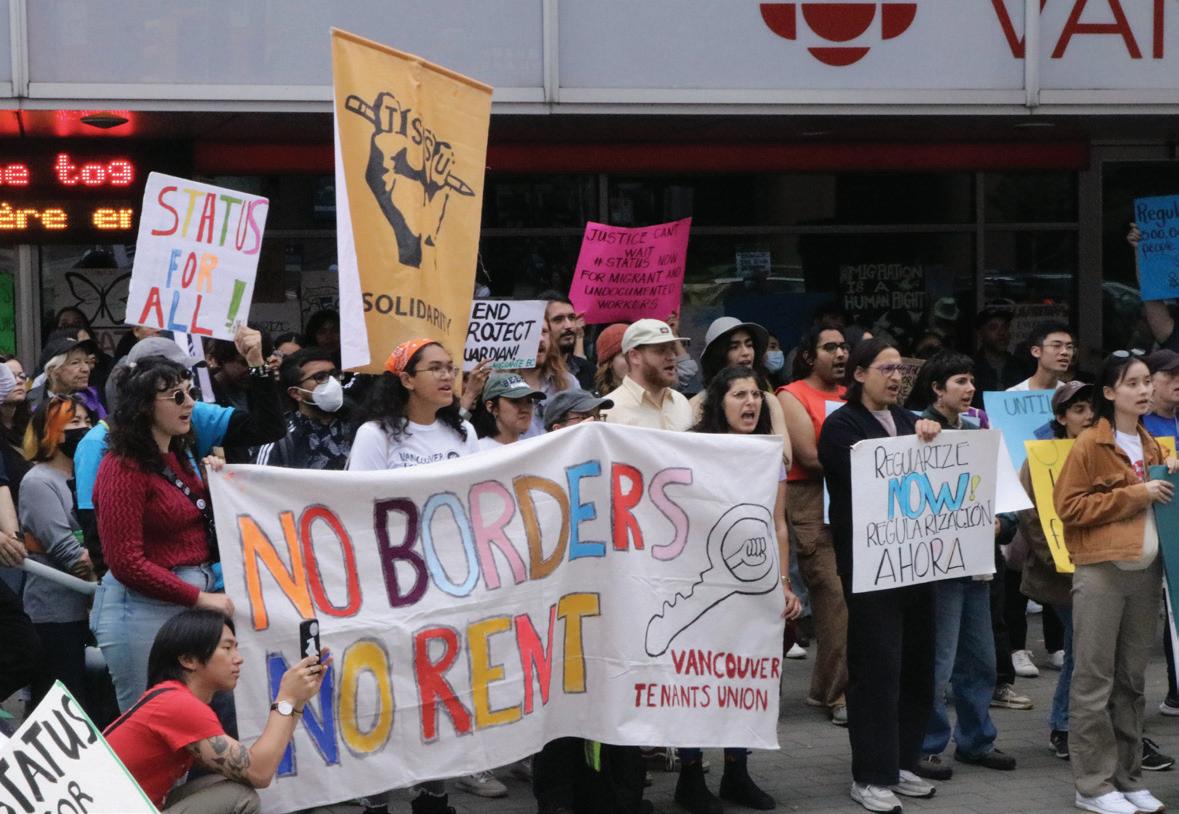
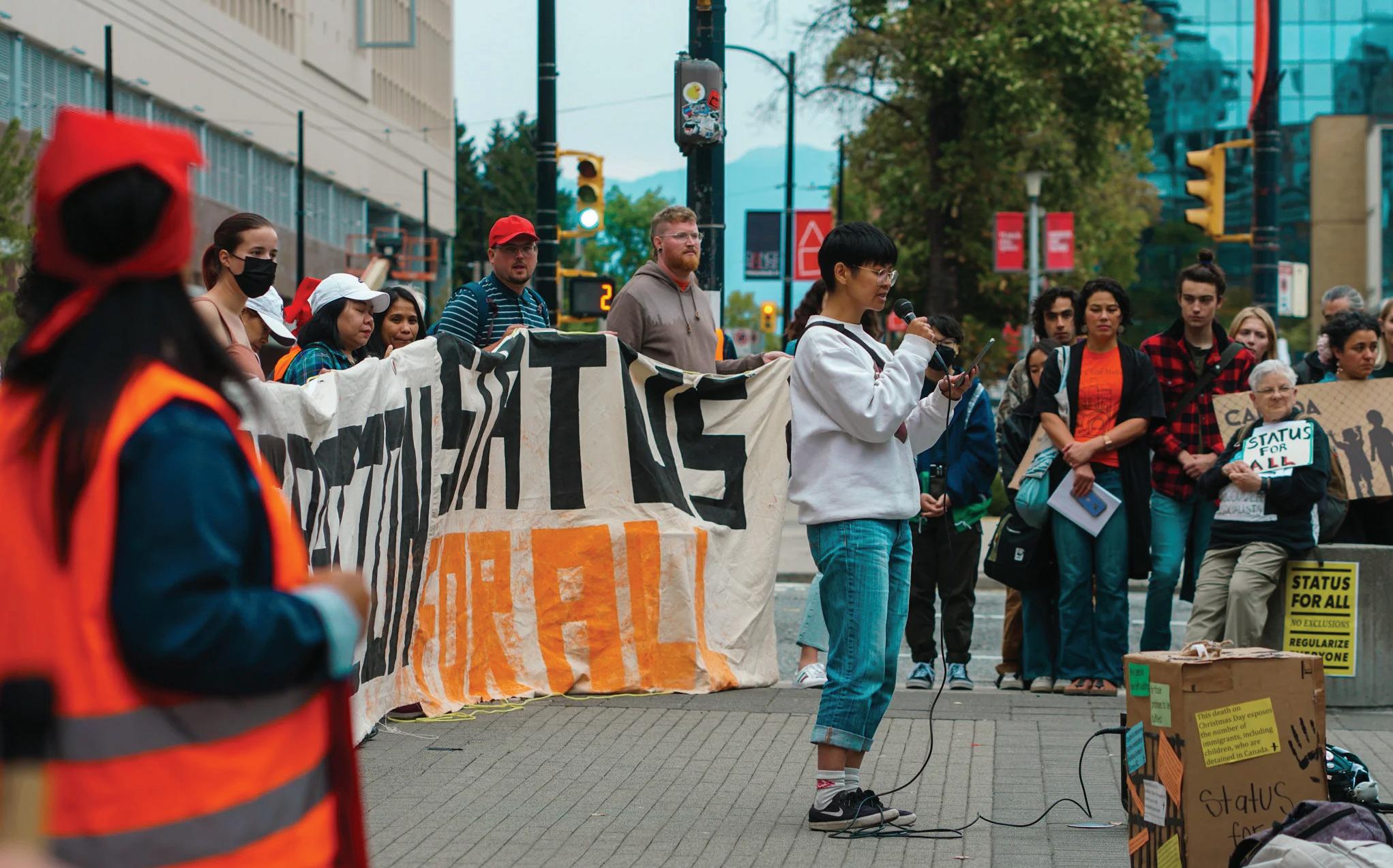
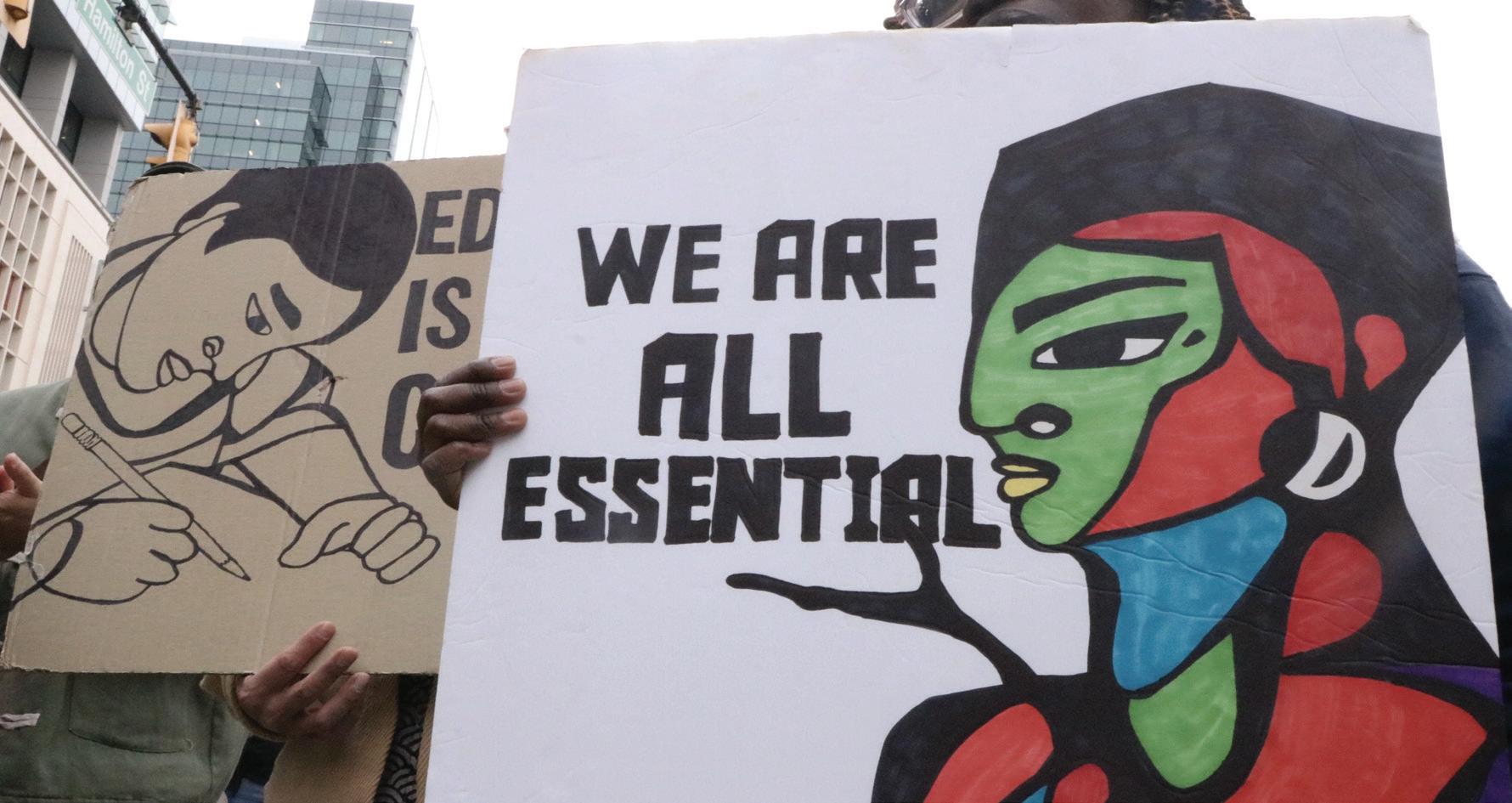
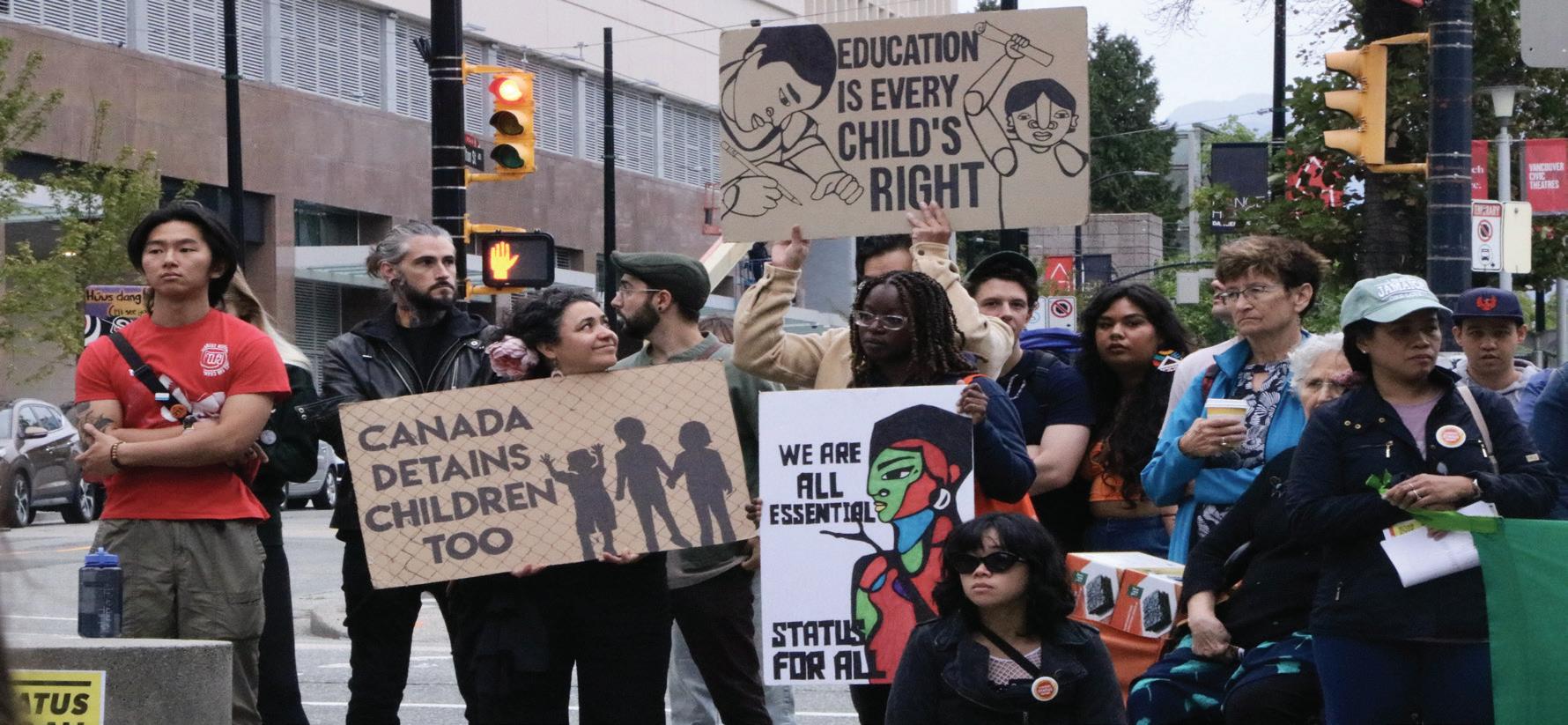
September 17 was intentionally chosen to call attention to migrant injustices prior to the Cabinet meeting, which will discuss and make decisions regarding pressing national concerns.
In 2021, Prime Minister Justin Trudeau announced his government’s commitment to regularize the status of migrant workers. The rally aimed to call attention to the commitment.
In 2022, Ottawa announced they have been working on a program to regularize 500,000 immigrants.
Activists are calling for the
Trudeau government to grant permanent resident status for all undocumented people.
Gizel Gedik, a student in international relations and history and one of founders of MSU at UBC, said the university “does not equitably treat its migrant students, especially racialized migrants.”
This year, UBC discontinued the Trek Excellence Scholarship for international students, a no-application award given to students with exceptional academic achievement.
Gedik also noted that only international students have to pay for healthcare in BC, and advocated for free healthcare for all.
Gedik asked UBC “to demand that the province funds secondary education” instead of “raising our tuition every year.”
While tuition raises for domestic students are limited to 2 per cent by law, international tuition raises are not and have been consistently raised by more. UBC has said tuition increases are necessary to continue university operations alongside inflation.
She said UBC needs to “do a better job at representing the migrant student body that they use as cash cows to fund the institution.”
Through these speeches, speakers made sure to highlight the links between migrant justice and other forms of justice such as climate and housing.
They urged the crowd to sign a petition through the Migrant Rights
Network to demand Status For All.
The rally concluded with a piñata, which portrayed images of a border, Trudeau’s promises as well as the names of migrants who have died waiting for status.
A speaker read out their names and the crowd repeated them back. Youth in the crowd then hit the piñata with a hockey stick to represent smashing borders in solidarity and candy spilled out onto the plaza.
Gedik said migrants and allies must unite.
“We also gathered together as a migrant community and allies to show that people here do care about migrants and we do support them and we are in solidarity with them.” U
EDITORS AISHA CHAUDHRY + RENÉE ROCHEFORT NEWS SEPTEMBER 26, 2023 TUESDAY 3 ON OUR RALLY BEAT //
KATRIANNA DESANTE / THE UBYSSEY ZOE WAGNER / THE UBYSSEY
ZOE WAGNER / THE UBYSSEY
KATRIANNA DESANTE / THE UBYSSEY
ZOE WAGNER / THE UBYSSEY
Teaching Assistants have a new collective agreement
Shih-Wei Wang Contributor
Members of component 1 of the Canadian Union of Public Employees (CUPE) 2278 at UBC have approved a new collective agreement.
The agreement takes effect retroactively from September 2022-25, including increased wages and benefits for teaching assistants (TAs), graduate academic assistants, tutors and exam invigilators at UBC’s Centre for Accessibility.
WHAT HAS CHANGED?
In a statement to TheUbyssey , UBC’s Executive Director of Employee and Labour Relations Mike Vizsolyi said “the parties worked hard to align the agreement with UBC’s strategic plans, including the Inclusive Action Plan and Indigenous Strategic Plan.”
Changes implemented in the new bargaining agreement include setting up a religious and cultural observance leave as well as a two day leave for Indigenous ceremonial, cultural and spiritual events without loss of pay.
In an interview with The Ubyssey , Kaili Vesik, a representative from the linguistics department who was part of CUPE 2278’s bargaining team, praised the addition.
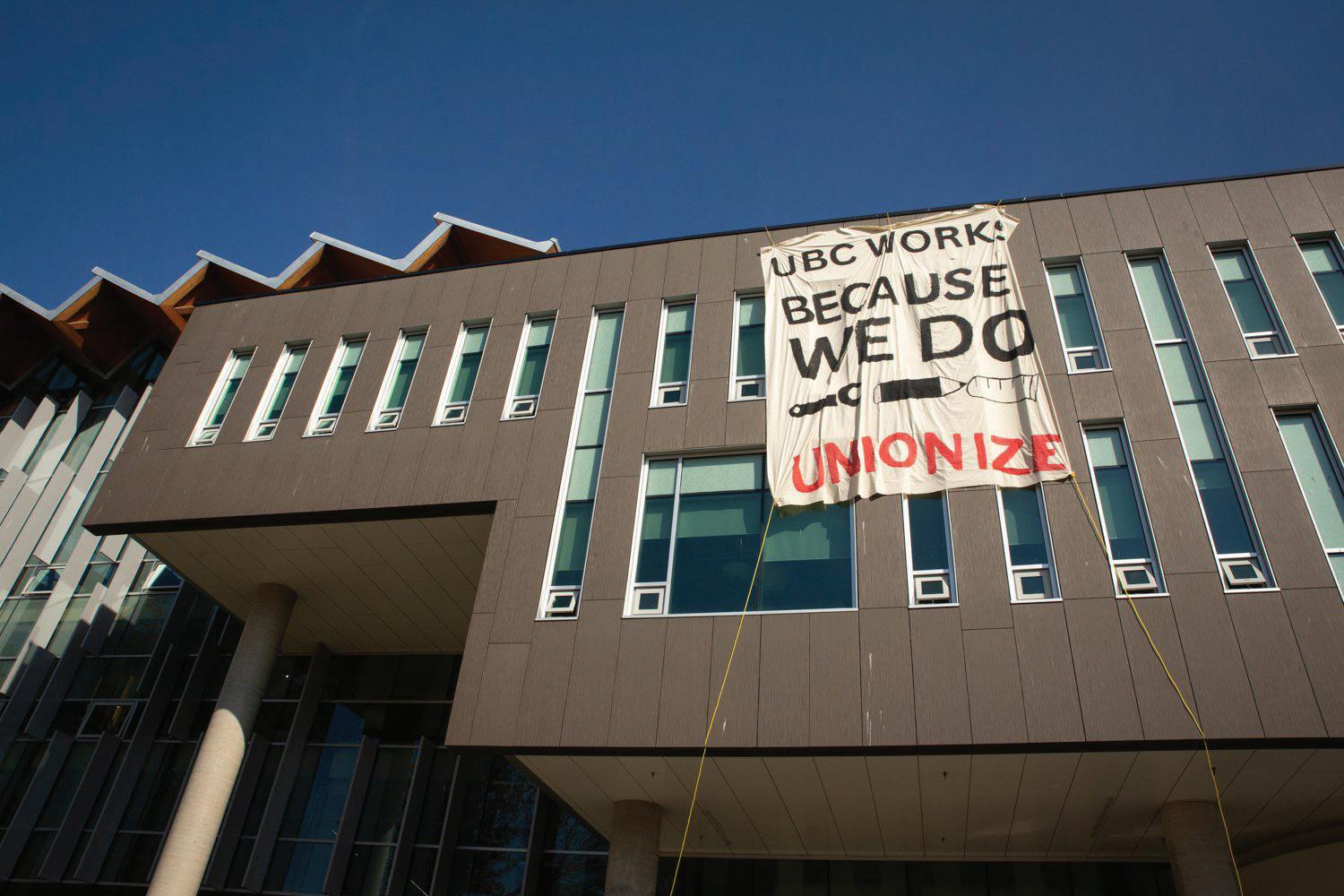
“There is added flexibility now … for people whose cultural experiences and priorities don’t fit into the regular sort of Christian-based calendar that our holidays are based around.”
The new agreement also expands the definition of who can be recognized as family for fiveday bereavement leave.
CUPE 2278 President Emily Cadger said there was previously a “hierarchical bereavement relief.”
“[For] certain family members, you would get five days off, like parents and spouses. And then for other family members like your siblings, you would get three days off.”
Cadger noted how this categorization system may not realistically reflect people’s relationships and how people process grief.
In the new agreement, employees are able to choose who to designate as family, which can include roommates, common law partners and close friends.
Vesik said the change is “more inclusive of people who don’t have traditional family structures. Or who have … meaningful long term relationships with people who are outside of those bounds.”
A WAGE INCREASE
Between September 2022 and September 2023, UBC undergraduate TAs wages ranged from $21.24 to $23.76 per hour, and graduate TAs made between $35.15 to $36.52 per hour based on seniority in the past collective agreement between UBC and CUPE 2278. They were also entitled to four per cent vacation pay. This year, all wages are increased by 6.75 per cent.
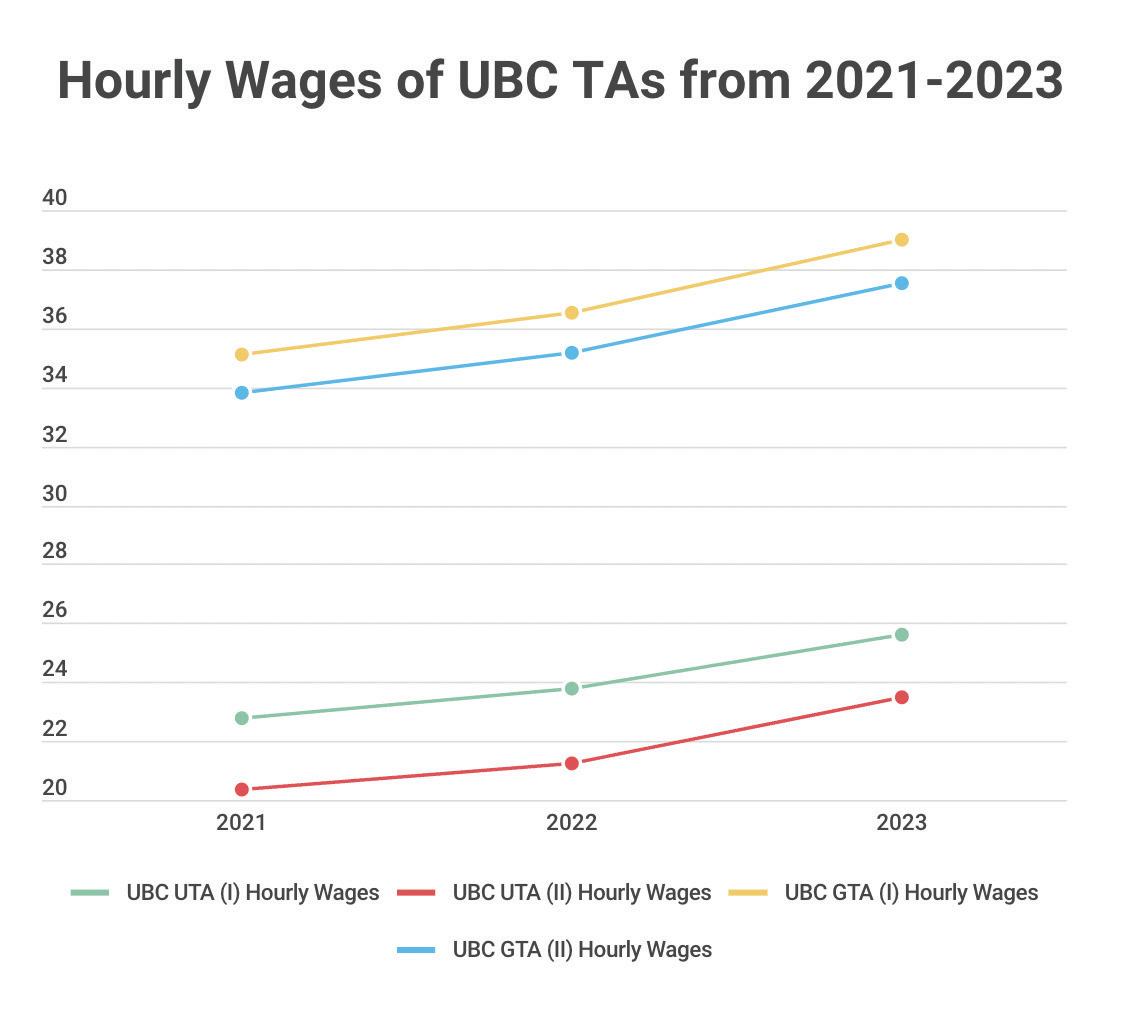
From September 2023 onwards,
This year, all wages are increased by 6.75 per cent.
undergraduate TAs’ wages range from $23.48 to $25.63 per hour, and graduate TAs wages will start at $37.53 and cap at $38.99 per hour.
Following the new agreement, TAs are entitled to receive retroactive payment making up the difference between the two wages for any work done during the 2022/23 winter session or the 2023 summer session.
According to the members of the CUPE bargaining team, one of their main priorities was to help increase the wages of their lowest paid members, undergraduate members and exam invigilators.
IN COMPARISON
Both the University of Toronto (UofT) and McGill University do not differentiate between graduate and undergraduate TAs.
As of August 2022, all McGill University’s TAs were paid $33.03 per hour with six per cent vacation pay. The most recent agreement for UofT TAs notes the wage as $47.17 per hour with an additional four per cent vacation pay.
When asked about the wage gap between UBC TAs and McGill TAs, Cadger said that McGill TAs are not represented by CUPE, and that individual provinces in Canada have a lot more say on what happens to their unions and localities.
In regards to the difference between UBC and UofT, Cadger noted BC’s Shared Recovery Negotiating Mandate, which applies to public sector employers with unionized employees. It outlines how general wage increase is implemented each year.
The PSEC Mandate, which dictates the terms of wage increases for unionized public sector
workers in BC, is something that Ontario does not have.
“They can go to the table, and be like ‘we want 11 per cent in one year’ which you can’t do in BC because it’s mandated,” said Cadger.
Cadger also noted differences between UBC and UofT in union dues structures may be an indicator for why UBC TAs are paid less.
Dues refer to payment made to unions like CUPE 2278 by its members to fund its operations.
“Ours are very low, they are only two per cent,” said Cadger. Cadger added “It’s not always the case, but it also has to do with student bodies. So UofT has a lot of people. Their locals ha[ve] a lot more resources because they have more dues [as well].”
WHAT IS NEXT?
Cadger said one of CUPE 2278’s goals following this agreement is to set up a health spending account for their members. This account would reimburse union members for extra health costs, eyeglasses and dental care, which may not be completely covered under the students’ AMS/GSS Health & Dental Plan.
Vesik and Cadger are both optimistic about this summer’s bargaining process.
“There were many discussions but we came out feeling really good about what we achieved. I was really pleased to be at a negotiating table, where it felt like both sides were negotiating in good faith,” said Vesik.
“It really felt like we were being listened to when we were like ‘hey, this is an issue.’ And they were willing to listen, and really go back and forth with us to talk about it,” Cadger said. U
Hourly wages of TAs in major Canadian universities
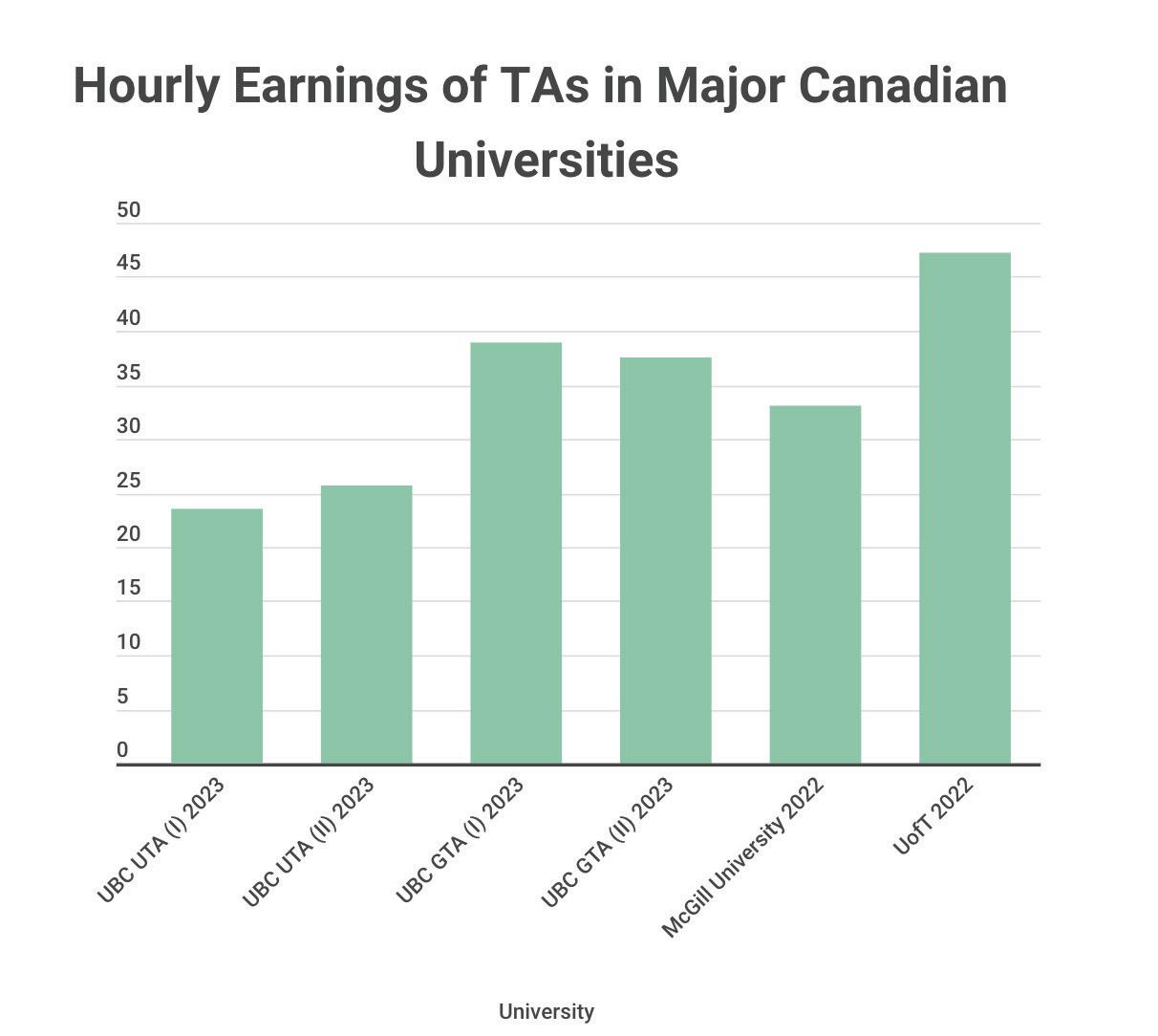
4 | NEWS | TUESDAY SEPTEMBER 26, 2023 GET THAT DOUGH //
ANABELLA MCELROY / THE UBYSSEY
Hourly wages of UBC TAs from 2021-2023
Cess Lee Contributor
“Hey-ho, hey-ho, fossil fuels have got to go!” chanted thousands of protestors last Friday as Vancouver joined others across the world to strike against climate inaction.
The march, which began at Vancouver City Hall and went toward the Vancouver Art Gallery, brought together community members of all age groups, ranging from children to university students to retirees all with one goal in mind: climate justice.
The energy was high in the crowd. Cheers from the front reverberated to the back line of marchers, and bands were stationed along the route, tweaking the lyrics of familiar tunes to target the harmful actions of big corporations.
As they made their way across Cambie Bridge, the protestors shouted, “What do we want? Climate justice! When do we want it? Now!”
Many also brought signs highlighting the recent issues climate change has caused in BC.
One sign read “Canada is on Fire,” referring to this year being one of the most destructive wildfire seasons for BC. Another read “Frack Free BC” — a jab at the BC
LET’S LOBBY //
Fiona Sjaus Senior Staff Writer
The AMS has published its demands for the 2024 Federal Budget in cooperation with the Undergraduates of Canadian Research-Intensive Universities (UCRU).
UCRU’s seven demands prioritize international students. It also aligns student unions across the country’s largest 15 research universities that represent the needs of over 240,000 students.
As part of UCRU, the AMS is responsible for releasing a set of annual demands to be integrated into the following year’s federal budget in preparation for provincial and federal lobby weeks that occur each fall.
This year’s implied plan outlines seven demands according to their impact, feasibility and relevance on Canadian post-secondary campuses.
“Streamlining demands … involved an assessment of the actions to prioritize the most critical students’ demands that needed the most attention, especially post-pandemic and looking into the other economic and wellbeing factors,” said Bandhul Vikas Khanna, AMS associate vice-president external affairs in a statement to TheUbyssey
The Canadian Experience Class (Express Entry) program allows temporary Canadian residents with one year of skilled work experience to apply for permanent residency. However, the program currently prohibits full-time students from gaining permanent residency status, even if they have gained work experience through co-op. Co-op does not meet the official Express Entry program requirements.
government subsidies for oil and gas extraction and other signs like “Delay = Disaster” and “For our kids” confronted the broader issue of climate inaction.
Natasha Pappas, a fifth-year
UBC psychology student, marched with a sign challenging the Trans Mountain Expansion project that aims to build pipelines to transport oil from Alberta to BC.
“We need to start switching to
renewable energy as soon as possible,” Pappas said. “People always say, ‘Oh, we’ll do it eventually’ but no, we need to do something now.”
The march ended at the Vancouver Art Gallery, where
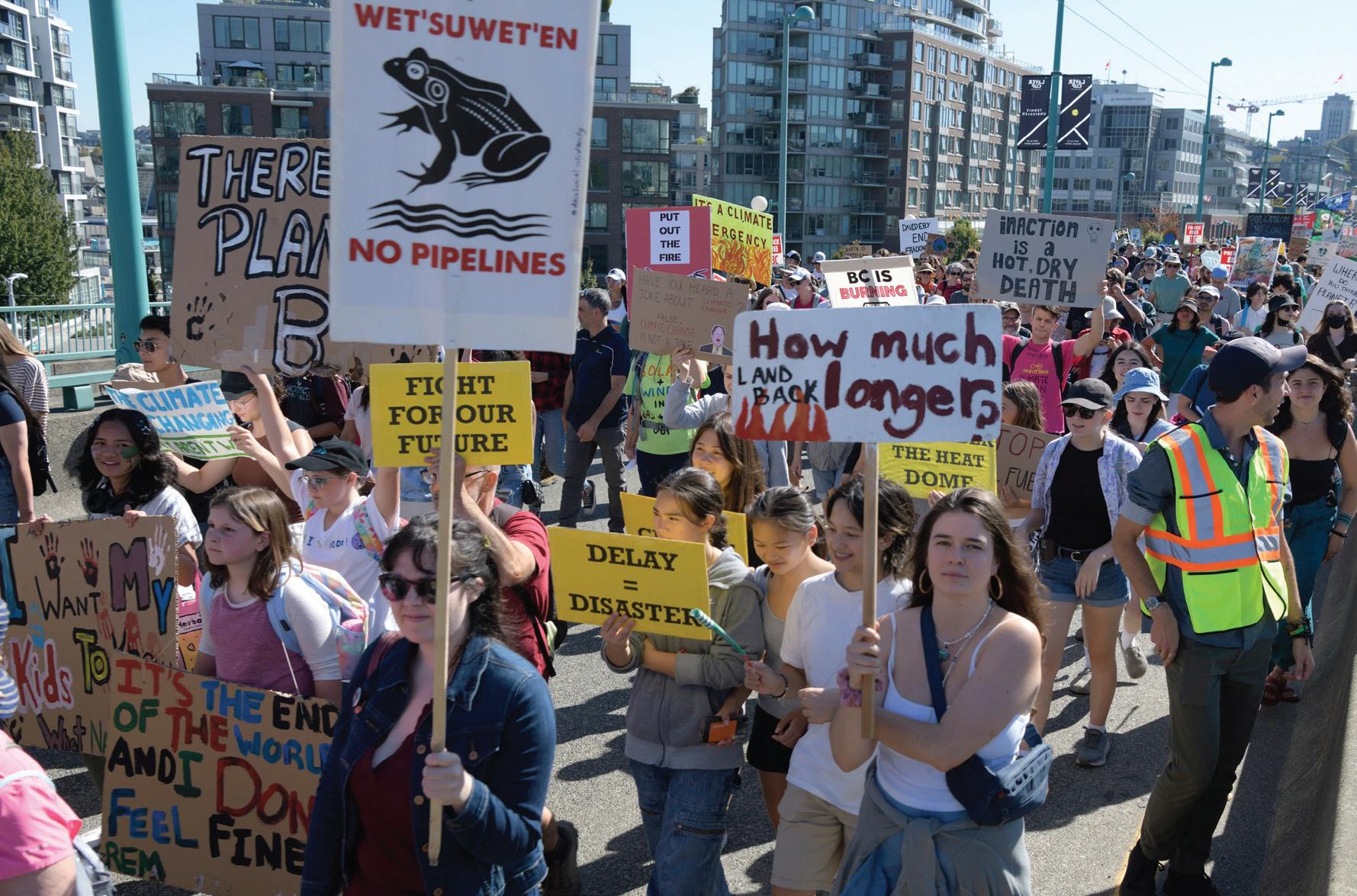
climate activist groups were stationed alongside live music and speeches.
Suvern Cullis-Suzuki, an activist and writer from the David Suzuki Foundation, directed attention to the extreme weather events and disastrous situations caused by climate change, stating that “every Canadian has personally felt some effect of climate change this summer.”
“Now we are waking up. Now, it’s personal, and now it’s universal. We are here now, awakened to call on our governments to act like leaders,” said Cullis-Suzuki.
Climate Justice UBC (CJUBC), was also at the march. Yeslie Lizarraga, a CJUBC coordinator, said “I think the idea of having a strike is for the government to realize that people want climate action, and that their inaction is no longer invisible, and people are noticing, and people want to keep them accountable.”
She also spoke about the joy that can come from the climate movement.
Vancouver marches for climate justice 2024 AMS federal budget centres international student support
“I know climate is a hard topic and a lot of people might not want to engage with it because it can be discouraging and scary … but I hope that people can also know that the climate movement can be joyful.” U
One demand is to dismantle the 20-hour workweek cap for international students.
“We aim to discuss the expansion of this program to include the full-time work experiences of international students with the Minister of Immigration, Refugees and Citizenship during Federal Lobby week,” Khanna wrote.
This demand looks to amend the Express Entry program so fulltime international students can put part-time employment experience towards permanent residency requirements.
Another demand is to dismantle the 20-hour workweek cap, which limits the number of hours of hours students from outside of Canada
can work off-campus and was previously temporarily eliminated in October 2022. A permanent stop would grant international students more work-life flexibility and help tackle the nationwide labour shortage.
The AMS also included renewing the Building on Success: International Education Strategy. Originally a five-year plan (2019–2024), the strategy has a $147.9 million budget and supports up to 11,000 undergraduate students in their studies and work abroad.
With the growing number of international students, howev-
er, many of whom are looking to apply their local studies to regions outside the country, the AMS is demanding a five-year extension for the plan with an increased budget of $165.6 million.
“International students often face unique challenges related to tuition costs, work opportunities, housing, scholarships [and] funding, and settlement services in Canada,” Khanna wrote.
“For 28% of the UBC population which is an evolving demographic, advocating for [international students’] needs was a response to the growing concerns and challenges
faced by them,” continued Khanna.
The AMS also proposed a four-year post-secondary mental health infrastructure fund that would “provide direct capital and short-term operational funding to post-secondary institutions” to establish high-quality, affordable and accessible mental health resources for students, according to an AMS Instagram post.
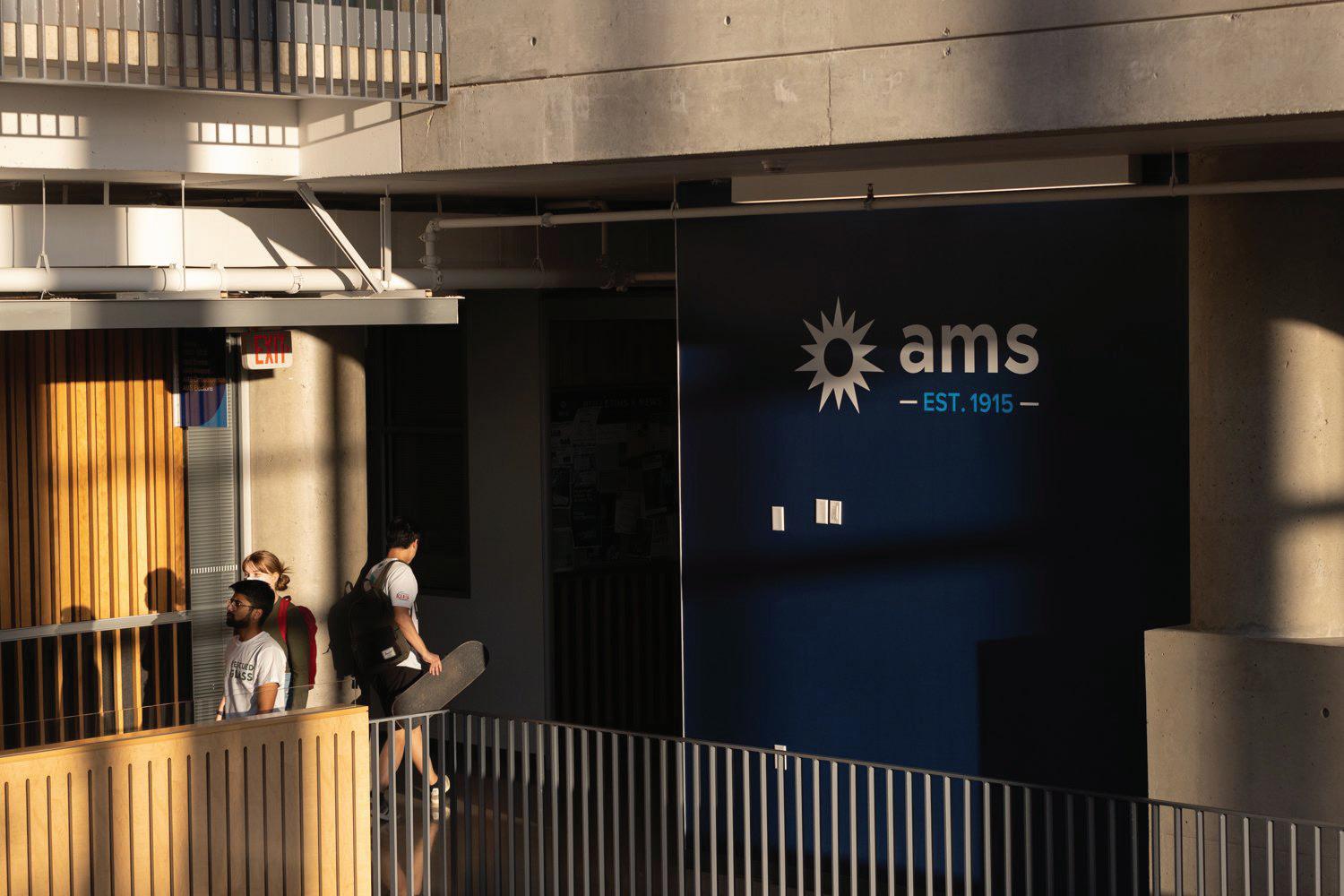
The demands also look to establish a federally funded initiative to support the construction of student housing on post-secondary institution campuses with $800 million in mixed funding models.
“Federal funding for student housing offers a promising solution by granting universities greater financial independence in managing housing,” wrote Khanna. “This independence can reduce reliance on tuition fees and provincial grants, promoting sustainable and accessible higher education.”
“Unlike institution-based funding, which can limit oversight, federal funding empowers institutions to address the affordability crisis effectively.”
The plan also lays out the demands to continue the post-secondary student support program after 2024 and maintain the maximum funding of the Canada Student Grant Program at $4,200 per year.
Khanna wrote that challenges and disagreements between the AMS and legislation could arise due to budgetary constraints or conflicting policy priorities.
“We hope our advocacies, with ongoing engagement with relevant stakeholders, bring positive changes for the UBC student community.” U
SEPTEMBER 26, 2023 TUESDAY | NEWS | 5 DELAY = DISASTER //
Protestors shouted, “What do we want? Climate justice! When do we want it? Now!”
LEONARDO DEGORTER / THE UBYSSEY
ISABELLA FALSETTI / THE UBYSSEY
Embracing collective resistance at ARTIVISM 2023
Elena Massing Culture Editor
“Madness in the Masses” is the theme for this year’s ARTIVISM, an annual visual and performing arts festival that centres topics in social justice and amplifies the voices of marginalized artists.
With the support of Exposure UBC and BC Culture Days, fourthyear social justice and visual arts student Jesse Medrano is curating a series of events celebrating resistance and resilience. The theme was inspired by a book that Medrano read in a philosophy course: How to Go Mad Without Losing Your Mind by La Marr Jurelle Bruce.
“It really resonated with me how he talked about madness as a symptom of oppression, and how he talked about all these different kinds of madnesses and how they’re intertwined,” said Medrano.
Like previous ARTIVISM festivals, Medrano is collaborating with the Hatch Art Gallery. In addition to an exhibit running until mid-October, there will be an opening reception on September 26 at the Hatch featuring performance art, a dialogue circle and an open mic.
Sprouts and Sulong UBC will work together to host a “People’s Picnic” on October 13 to amplify Sulong’s campaign to combat food insecurity. People will also have the opportunity to sip coffee and listen
to activists tell stories of resistance on October 4 at “Human Library: RealiTEAs of Resistance,” or watch surrealist films challenging capitalism at a UBC Film Society screening.
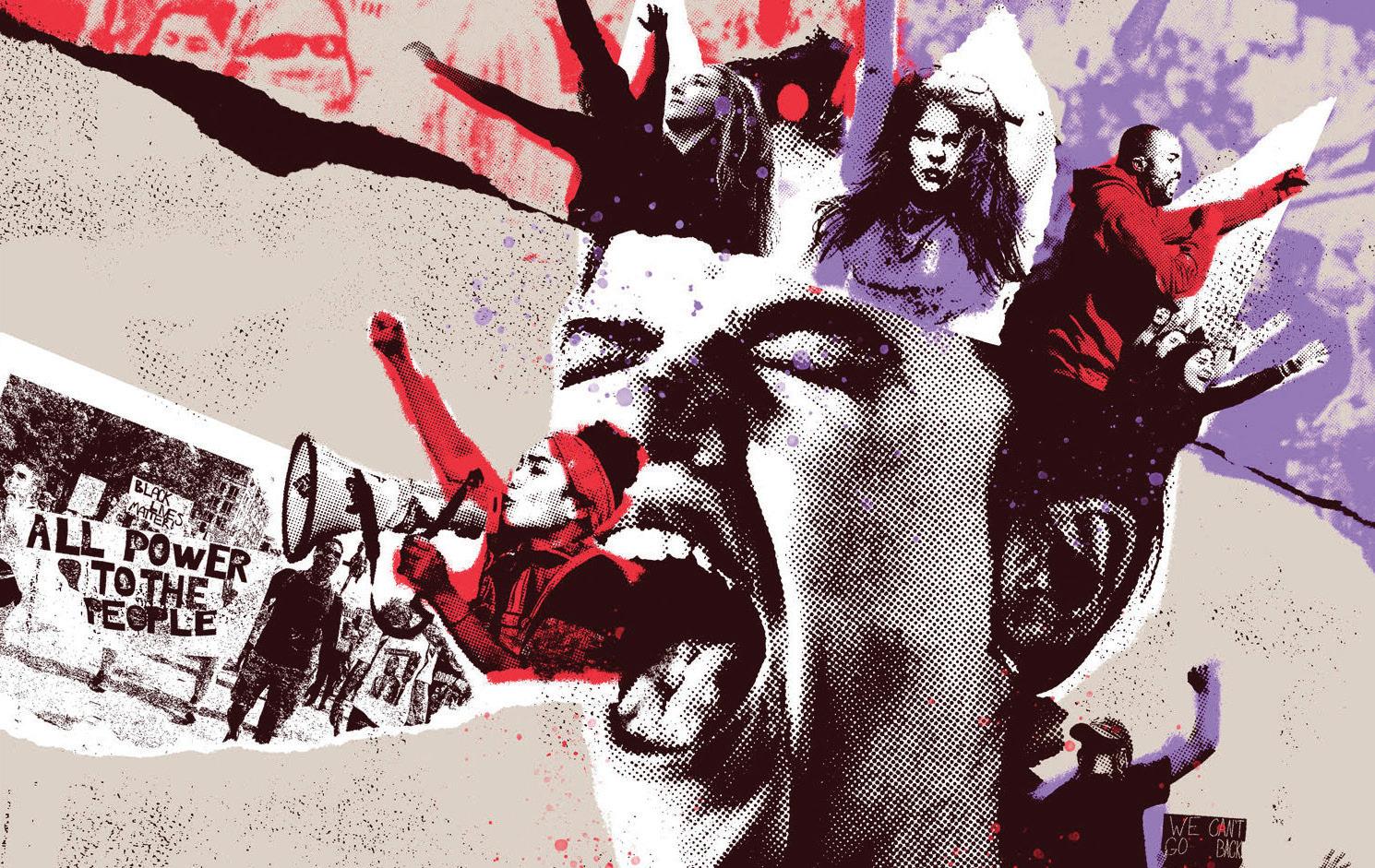
Unlike past directors, Medrano is not a media studies student— while others gravitated toward music and literature-based events, she wanted to take advantage of her social justice background. Her goal when organizing the festival was to “put the activism back in it, and try to highlight some student activist groups and see what events they wanted to curate.”
In her time with Sulong UBC, Medrano learned about the Filipino practice of “talambuhay” — sitting down with others and taking the time to tell the entire story of how you got to where you are now. It encourages compassion and understanding, and as a result, helps activists build a stronger support system.
“I think capitalist systems are really good at distancing people’s struggles from real problems … people can get very individualistic,” said Medrano. “I really wanted to foster this narrative of ‘Let’s hear other people’s stuff, let’s put it out there, it shouldn’t be taboo.’”
She drew inspiration from “talambuhay” when planning this year’s events, which include a playback theatre experience on
October 11 where participants share a story from their life, then a group of actors bring it to life. Medrano recognizes that it sounds daunting, but when she tried it out, she found that seeing her life from someone else’s point of view was “really therapeutic and healing.”
“It’s to really ignite critical engagement and humanize marginal-
ized voices,” said Medrano, when asked what she hopes attendees can take away from ARTIVISM.
“Hopefully, even if people may not come from that background, they empathize with it.”
She hopes that the partnerships with various social justice organizations will inspire more people to get involved in initiatives on campus.
“By supporting one, you’re kind of supporting all, and becoming part of this collective … You see how many people really do care, and it makes you imagine [how] these better places can start existing.” Information about upcoming ARTIVISM events can be found on exposure’s Instagram page (@ exposure-ubc). U
Nimrods confronts the “pater” in patriarchy
Julian Forst
Senior Staff Writer
Kawika Guillermo’s name was chosen by his mother. It’s Hawaiian; a localization of the Hebrew David, and it meant a lot to her, the daughter of an Ilocano preacher who’d immigrated to Hawai’i.
Decades later, Guillermo writes how his mother’s white American husband rejected the name, so “[his] kids wouldn’t be in that gobbledygook … they’d have right Christian names.” So the baby was christened Christopher Benjamin Patterson, and his father tried to raise him so he’d go to heaven.
Now Guillermo writes poetry with his mother’s name and academic papers with his father’s — as Patterson, an associate professor at UBC in the Social Justice Institute.
In his latest book, Nimrods: A fake-punk self-hurt anti-memoir, Guillermo touches on white guilt and saviourdom, masculinity, academia and the echoes of fatherhood in a series of poetry and prose vignettes set throughout his life.

Guillermo said that he’d always baulked at the idea of writing a memoir, as “they always seem so individual, occupying one particular voice.” His poetic take on the book’s structure came about as a way of overcoming this. It allowed him to “access really dark things. You’re taking the weight off of thinking about the structure and the style, and you’re just getting straight to the raw, unpolished materials [of] reality.”
The book started taking form after he became a father. “If the kid doesn’t sleep you don’t sleep,
right?” he joked. “The poetry started to come back with insomnia. Words started to float around and stick with me in ways that they didn’t before.”
“It’s called an anti-memoir partly [because] it’s based on my
own experiences but it’s not, in my opinion, really about me,” he said in an interview with The Ubyssey
Sure enough, Nimrods opens with a crying child waking up his dad. This is Guillermo, who had
hoped for a daughter, but got a son. Now he’s afraid of recreating his own father’s baggage.
Here’s our introduction to the memoir’s main narrative focus — the relationship between the author and his alcoholic, fundamentalist Christian father. With stylistic techniques ranging from biblical verse to punk lyric, Guillermo paints an empathetic, yet resentful picture of an abuser formed of ignorance and fear. The character is unable to reconcile his own failures with images that white male dominance have spoon-fed to him since birth.
“This book,” said Guillermo, “is a way of getting through to find a common ground [with him], fatherhood or parenthood being one of them now.”
The memoir is divided like a Greek ode with strophe, antistrophe and epode; each section takes on a unique form and approach to memoir. The first reads like an anthology of separate poems, jumping around from moment to moment, addressing each for only a page or two before moving on to the next.
This creates a hazy overhead view of Guillermo’s life to ground the more detailed second and third sections. Frequently, events introduced in the strophe make their reappearance later, expanded upon or recontextualised through a new perspective.
The formatting of the antistrophe is an obvious parody of the Bible, complete with footnotes and margin notation. It takes on the third-person perspective of Guillermo’s father and cleverly
critiques Western religious and social institutions by positioning this angry, hypocritical, self-righteous man as the protagonist of scripture.
The footnotes here are an especially biting touch. They chime in now and again, jarringly direct against the lyrical backdrop, to modify the main text with first-person accounts from Guillermo himself. In the margins, where you’d normally find definitions or translation of archaic language, Guillermo sprinkles impressionistic poetry to set the mood for the accompanying text.
The epode serves as a conclusion to the memoir, bringing up questions of personal and political reconciliation, which he worries may be “just a con, and no amount of armchair thinking can materialise forgiveness.”
Like the rest of the book, this section is shot through with references and quotes from music, literature and YouTube videos. “I’m trying to say a lot in the types of things and people I quote from. [The references] are a part of the poem too,” said Guillermo. These are all compiled in a list at the end of the book, complete with page numbers — I had fun flipping through to find all the easter eggs I’d missed after I was done.
Now Guillermo’s focus is on publicizing both Nimrods and his late wife’s new book Landbridge He predicts this “will take a lot of thinking, growth and more writing,” alongside the requisite feeding, changing and caring that comes with parenthood. U
EDITOR ELENA MASSING CULTURE SEPTEMBER 26, 2023 TUESDAY 6 IN OUR HEALING ERA //
ARTIVISM is running from September 6–October 19. COURTESY JESSE MEDRANO
Nimrods was released earlier this month. COURTESY DUKE UNIVERSITY PRESS
2 A.M. POETRY, EXCEPT IT’S ACTUALLY GOOD //

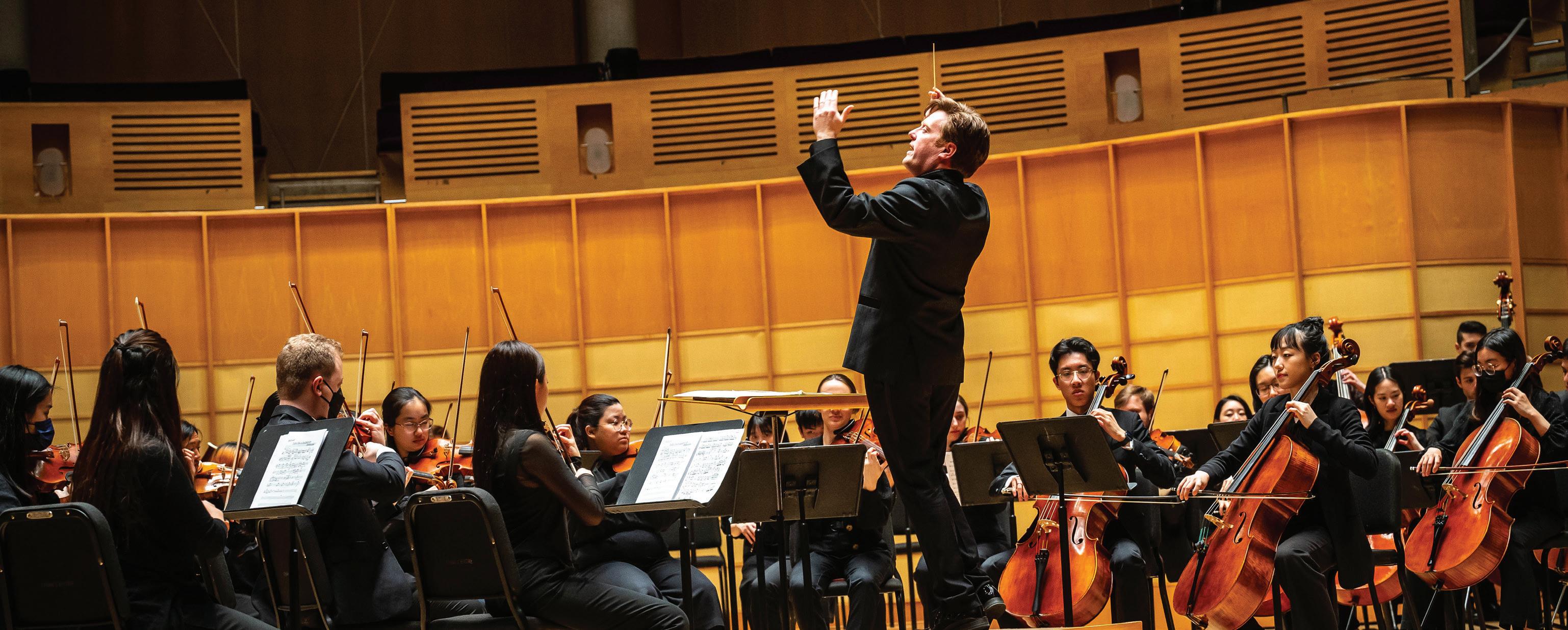
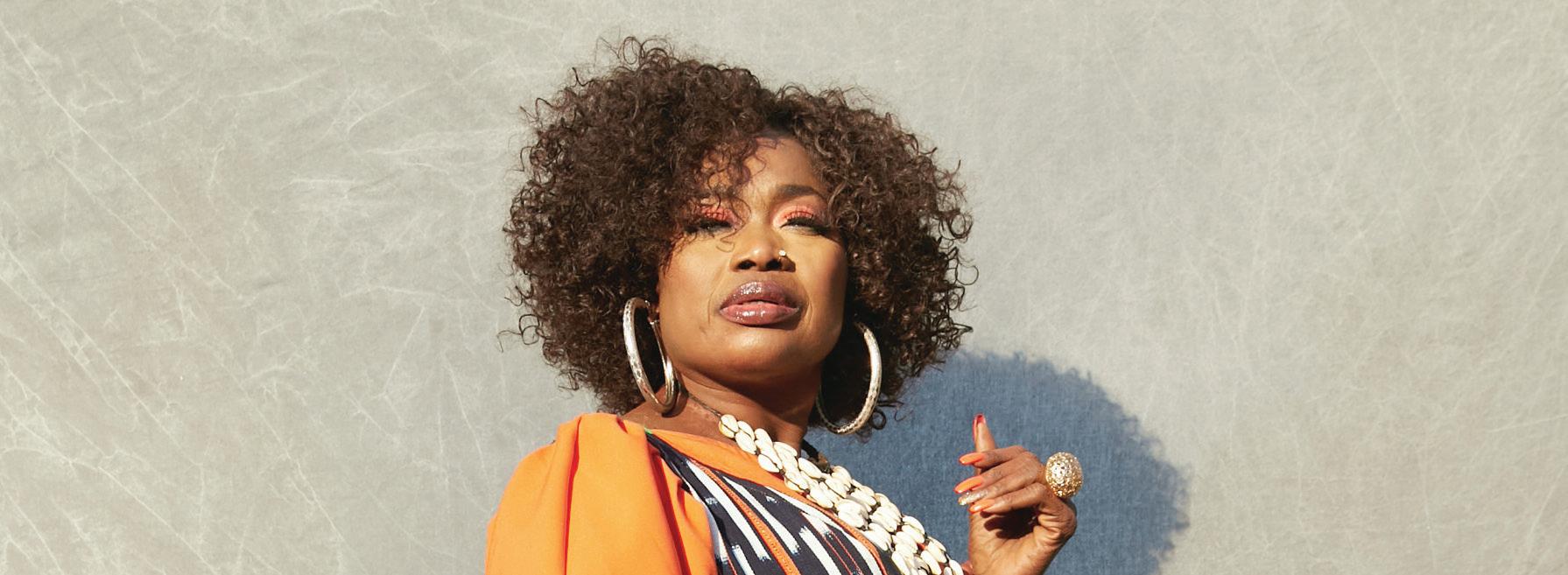
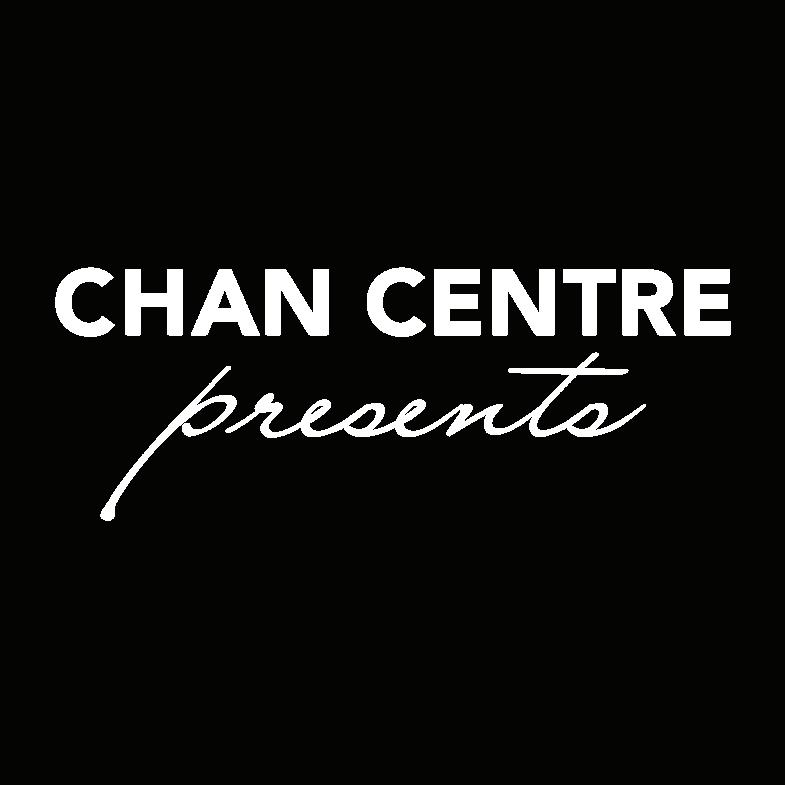
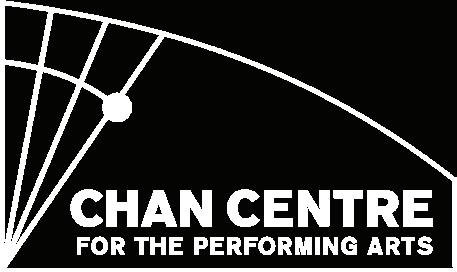


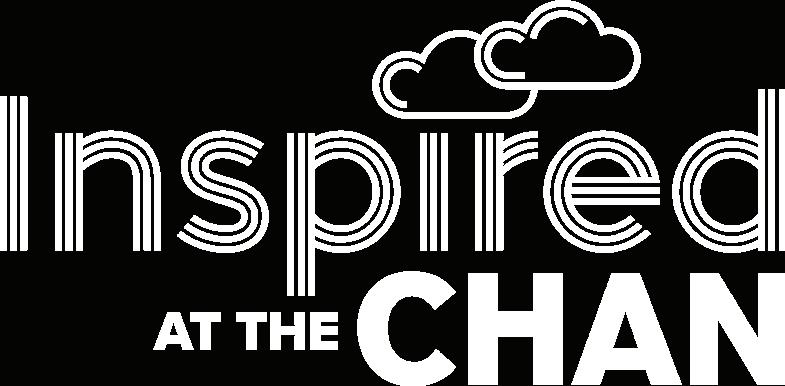
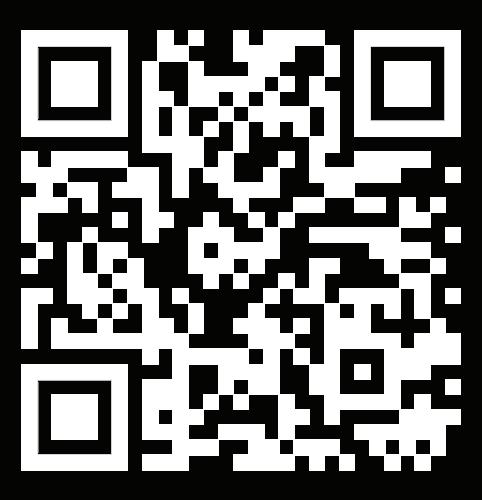
50% off tickets @chancentreubc @chancentre_ubc UBCBANDS UBCORCHESTRA UBCCHOIR Free for UBC Students Tickets from $5 Student discounts at chancentre.com Discover a world of music. ADVERTISEMENT
Bangladeshi voices are absent from climate policy. Abul Bashar Rahman biked across Bangladesh to hear them
More often than not during climate negotiations, Abul Bashar Rahman is the only Bangladeshi in the room.
And that often meant Bashar, a fourth-year international economics student, was representing his country and his people.
Bashar would ask himself questions in moments like this — “Am I the right person to represent Bangladesh? Am I the right person to tell these stories?”
“I am a climate victim in many ways, but when it comes to the impacts of climate change, there are worse off people in Bangladesh,” said Bashar. “At its core, [my work is] just to understand what climate impact means for my country.”
Bashar was in grade nine when he first learned about the climate crisis. Learning how Bangladesh would be affected and how “one-third of Bangladesh” would be underwater by the year 2050, shocked Bashar.
He also learned his hometown, Jhenaidah, in the southwestern region of Bangladesh would eventually be submerged.
Since then, Bashar has dedicated “a larger part” of his life to designing climate solutions, helping others develop solutions and funding and supporting climate interventions.
Bashar has previously struggled with climate anxiety — distress about the climate crisis and its impacts that over two thirds of youth experience — but now, there is “little room for eco-anxiety.”
“At the end of the day, it affects other people more than it affects me,” he said. “That gives you a sense of responsibility to ensure you’re using your position of privilege ... of power to ensure that you’re doing something about it.”
In November 2022, Bashar attended COP27 in Sharm El Sheikh, Egypt as part of UBC’s delegation — a ten-person group of four students, one staff and five faculty members.
While wondering if he was the right person to represent Bangladesh or not, he saw a lack of Bangladeshi representation in climate circles and negotiation rooms.
“This lack of representation means our stories … are not being shared with the global community,” said Bashar. “And that causes a lack of empathy … of action.”
Bashar soon realized how hopeless and immense the climate crisis may seem to many people, deterring them from taking action. He wanted to learn what he could do and what role he could play in climate action in Bangladesh.
So he quit his job.
words by Mahin E Alam photos courtesy Abul Bashar Rahman
A JOURNEY FOR CHANGE
This past summer, Bashar quit his co-op job in Toronto and returned to Bangladesh to start an ambitious project — to travel around the country on his bike to listen to climate impact stories from those who are suffering the most.
“When I decided that I’m going to go out there and document stories of people, I realized that in order to truly build the case for Bangladesh, I also need to back all my stories with data,” said Bashar.
Bashar scoured research on Bangladesh’s temperature increase, precipitation levels and climate vulnerability assessments in the past few decades. He said that climate research is hard to access because of its language, writing style and how it can be difficult to find what you’re looking for.
“I remember reading this report, which was looking at different datasets, and trying to understand what it means,” said Bashar.
Then, Bashar convinced his friends to be part of his project. Twenty-five have since been active members.
Now, they’re making a documentary and a Bangladesh climate atlas, similar to the Canadian atlas.
The documentary isn’t just about the climate crisis. It followed Bashar biking across Bangladesh as he meets people from remote areas living with the reality of the climate crisis, as they battle droughts, floods, torrential rain, air pollution and intense heat.
According to its website, Stories of Change aims to amplify the voices of resilience in Bangladesh by sharing climate stories.
Starting a project of this scale came with significant challenges. Bashar didn’t have any funding to get it off the ground.
“I spent the savings I had at the time on this project, the entirety of it, with the hope that we would raise money eventually,” said Bashar. “Although it had been a very big struggle in the beginning, we just knew that no struggle is as big as the struggle that Bangladeshis go through every single day due to climate change.”
The team launched a Kickstarter campaign, posted videos on various social media platforms and reached out to potential partners and sponsors to give birth to the project, Stories of Change.
Eventually, Bashar and the Stories of Change team raised funds and garnered support from sponsors to launch their project. Stories of Change is supported by the Office of the High Commission of Canada in Bangladesh.
Bashar biked from Teknaf, a region in the southernmost part of Bangladesh, through many cities and settlements to Tetulia, located in the northernmost region of the country.

This means he cycled over 926 kilometres, the equivalent of biking from Vancouver to Seattle, at least four times.
Throughout Bashar’s journey, he was struck by the kindness and hope he witnessed from the people he met along his ride. These people “shared their wisdom, without any hesitancy.” A tea stall owner refused payment since he wanted to help Bashar, but the best thing we could do was give him tea. Rickshaw drivers would cycle alongside him to learn more about his project. He was invited to people’s homes for dinner and still keeps in touch with people he met during his travels.
“That kindness is something that truly stood out for me.”
“Another thing that stood out for me was hope,” said Bashar. “I
think that was such a big reckoning for me in particular because oftentimes, when you don’t have anything else to hold on to, [hope is] something that they’re holding on to.”
INSPIRING ACTION
Bashar and the Stories of Change team aim to present their documentary and the climate atlas later this year at COP28 in Expo City, Dubai. He believes the Stories of Change project can be used “to identify where the climate impact is severe, to understand where they should design interventions and implement them at scale and build a strong case for whatever work [policymakers are] doing.”
But besides attending the world’s largest climate conference, Bashar said attending UBC and joining UBC climate justice groups have made him feel supported while taking risks and trying new things while shaping his understanding of climate education.
“There are a lot of people who care about climate justice and climate change at UBC,” Bashar said.
“Being a UBC student has a lot of privilege, especially if your
work focuses on climate change,” he said. “Some of the most brilliant minds working in this space call UBC home.”
Bashar said his journey taught him that hope is the antidote to climate anxiety.
“I think climate change is, in many ways, bringing a lot of people together,” said Bashar. “It’s so inspiring to see [world leaders] engage in dialogue and engage in conversations, and I think that is only possible because there’s still hope … because humanity still cares for each other.”
Bashar said everyone is capable of inspiring change and action, and that students should make their voices heard.
“When you have empathy, awareness and knowledge, that’s the recipe for action.”
Now Bashar feels confident in attending COP28, a year after he questioned whether or not he deserved to be there.
“I feel like I have a stronger hold of the material in terms of building a case for Bangladesh,” he said.
“This year I’m going as an advocate for Bangladesh,” said Bashar. “I know what matters and where immediate action needs to happen.” U
EDITOR IMAN JANMOHAMED FEATURES SEPTEMBER 26, 2023 TUESDAY 8
OUR CAMPUS //
Ask Iman: How do I make friends at UBC?
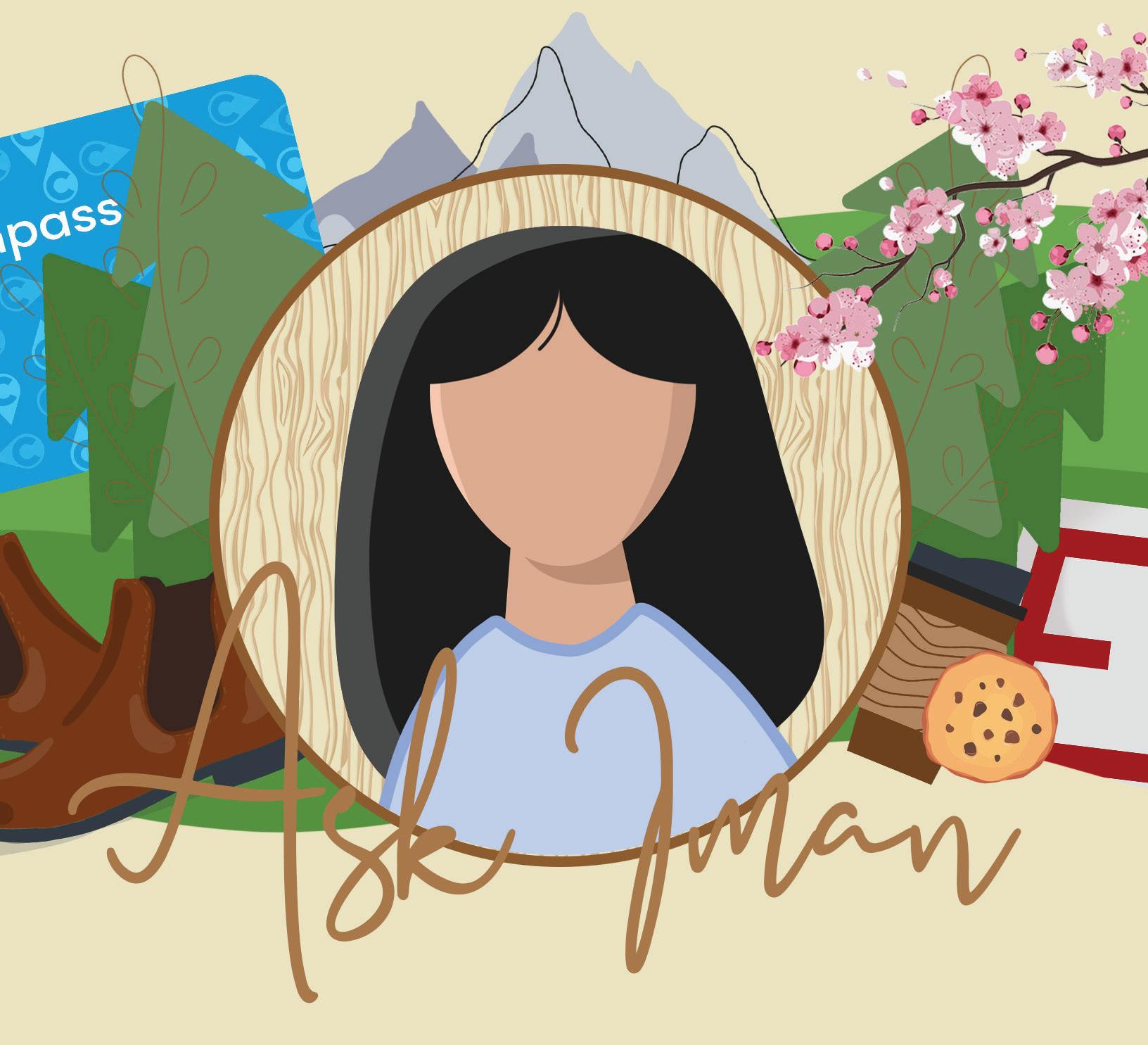 Iman Janmohamed Features Editor
Iman Janmohamed Features Editor
Hi Iman, UBC is huge and overwhelming, so how do I find friends on campus?
Making friends is scary! But just because it’s scary, doesn’t mean it’s impossible.
I know it’s something you’ve heard a million times over, but you have to put yourself “out there” to make friends. What does “out there” mean, though? It means going to class and chit-chatting with the person beside you. It means joining a club and actually going to events. And it means hanging out with others on your dorm floor when your RA hosts an event.
If you don’t give yourself the opportunity to make friends by opening yourself up, then you won’t be able to do it!
Campus is huge, and like you said, overwhelming. But you’ve got to remember one thing — everyone is in the same boat. It’s a cliché, but, it’s true. Everyone is just as nervous as you are, and everyone wants to make friends, be loved and have a sick college friend group that does everything together and has a ton of fun and works at the campus radio station and maybe is part of an acapella group and wait I’m just explaining Pitch Perfect
But seriously, the classic film that every film bro should study
instead of Fight Club or The Godfather or whatever, is Pitch Perfect. It teaches you how to make friends in university.
Let me explain: Beca didn’t make friends until she put herself out there by joining the Barden Bellas and getting her radio internship. If she didn’t do those things, she wouldn’t have met Chloe, Jesse, Amy, Benji and others in that cast of literal characters. And if she didn’t make friends, we wouldn’t have gotten a Pitch Perfect 2 or a Pitch Perfect 3 and that would suck (I love Pitch Perfect.)
UBC has so many opportunities to meet people embedded into campus culture. From the 300+ clubs under the AMS to support groups, classmates, campus jobs and other communities — university really is the place to meet people.
And hey, if you want to join a super cool community where you’ll make friends (it’s where I’ve met most of my best ones), come visit The Ubyssey in room 2208 of the Nest. We’re exactly like Pitch Perfect , except we’re student journalists and not in acapella. So not really like Pitch Perfect at all, but we have fun.
You’re doing great. Keep it up! U Need advice? Send your questions, queries or problems to advice@ ubyssey.ca, or submit anonymously at ubyssey.ca/pages/advice!
Letter: UBC and the AMS maintain class barriers to student mental health care
to which a family can provide that financial resources varies based on their socioeconomic status.
Access to care that can be critical and life-saving is only available to students born into middle to high income brackets. While the partial coverage from the AMS plan may give more people access, by not covering long-term treatment, students who are unable to pay for themselves or through their family’s support are still being excluded from health care by the AMS because of economic status.
Marie Erikson
Contributor
This year’s AMS/GSS Health & Dental plan covers $1,250 in claims for visits with mental health practitioners — equal to last year’s coverage and a reduction from the 2021/22 policy year.
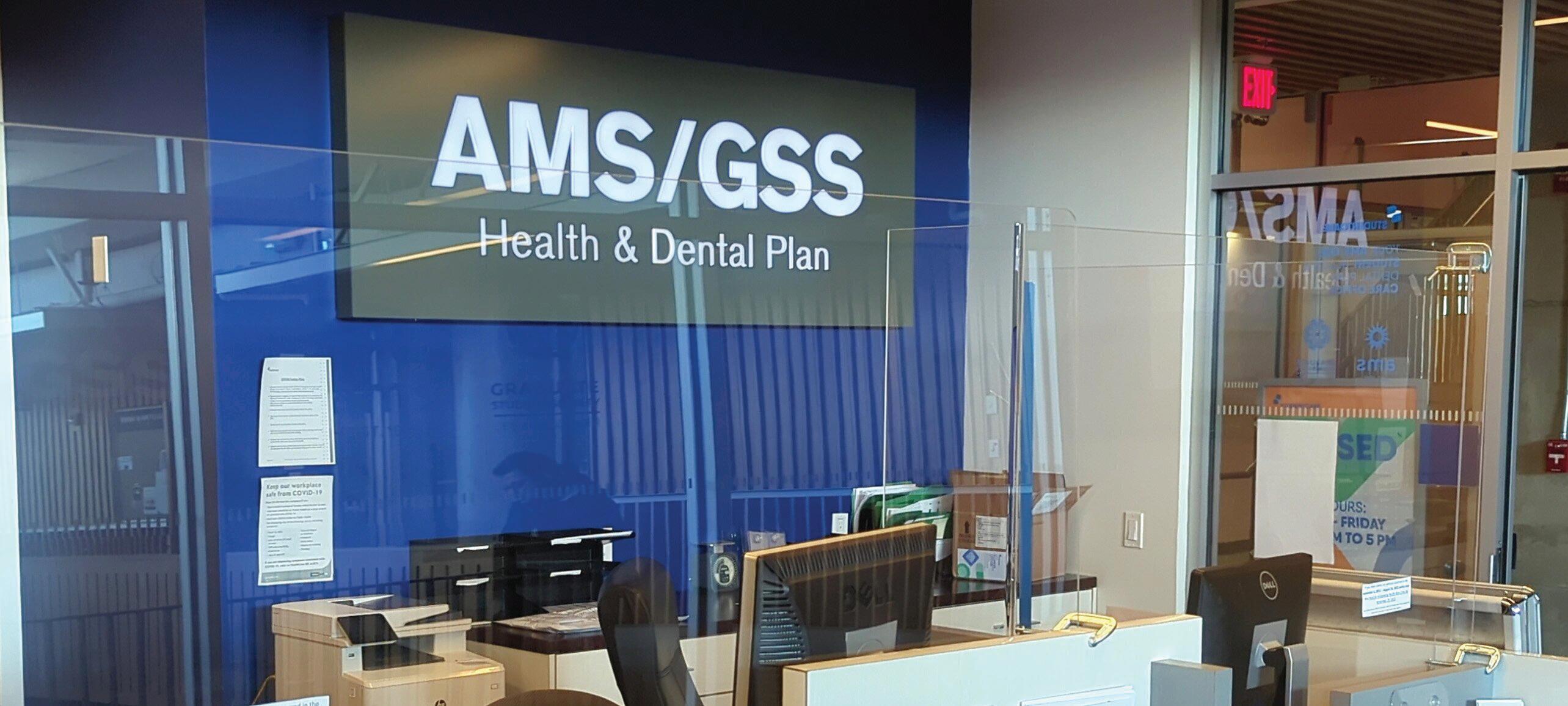
In a September interview with The Ubyssey, AMS executives said a now undone reduction to coverage was part of an effort to combat increasing costs. Students have previously criticized the limitations of coverage, forcing them to re-examine whether they can access essential care.
In my view, much of the problem lies in the history and expectations of the AMS’ mental health coverage more broadly. Assuming a rate of
$150 per counseling session, which is already higher than the $100 per session AMS President Esmé Decker implied at a August 23 council meeting, the current plan only covers about eight hour-long sessions.
Eight sessions can, of course, be helpful to students. Yet, for longer-term problems, this frequency of treatment is not nearly enough.
I have had counselling appointments weekly or biweekly for periods of months or years, and while it has been incredibly helpful so far, I currently need my regular appointments to continue indefinitely to maintain a functional level of health.
While the AMS supplement helps me access life-changing treatment, it is merely a supplement. I
do not credit it with enabling my access to care. For this policy year, coverage was reduced to 80 per cent of the cost of weekly appointments, down from full coverage in last year, leaving students in situations like mine to manage a cost in the hundreds or thousands.
This is a significant amount for anyone, but it is made especially more poignant when students are burdened with tuition and the challenges of the housing market. Without high incomes or large savings, which is generally not the case among this age demographic, students will often need assistance from family to access the care they need.
But even if one’s family is supportive of their efforts, the extent
Ideally, mental health services would be fully covered under British Columbia’s Medical Services Plan (MSP) or supplemented by UBC as part of its current budgetary priority to support students in areas including mental health. This could take the form of grants from UBC for students paying out of pocket for mental health care, similar to the first-year Student Housing Supplement Grant or the proposed international-student housing bursary on a broader scale.
Such changes could be funded by growing the students’ priorities portion of the operating fund, which for all categories totalled $54.9 million for the Vancouver campus.
Yet if the university is currently not subsidizing the longer-term care it has not offered, the responsibility falls to the AMS, our student union, to advocate to UBC on our behalf or create a comprehensive and effective program on its own.
To ensure this need is met without the full support of UBC,
the AMS needs to more actively prioritize the health and wellbeing of students, the society’s members, in its budget.
While smaller changes such as the one-time “emergency” increase to $1,500 of coverage for the 2021/22 policy year are helpful, we as students also need to prevent ourselves from being biased by the paltry numbers we’ve become accustomed to. We must continue to demand that the AMS meet our needs and properly allocate the financial resources we provide when its efforts the province and UBC fail. It will cost the AMS more, but it is more capable of finding funding for such costs than individuals.
And while AMS VP Finance Abhi Mishra said in a September statement to The Ubyssey that there are mental health resources available for UBC students, UBC does not provide professional long-term counselling, a critical gap the AMS coverage is intended to fill.
A well-functioning system would allow regular appointments to students regardless of their or their family’s financial situation throughout the year. Whether this takes the form of unlimited coverage or a cap several thousand dollars higher is up to the AMS and its insurance partners. Yet for now, currently the burden lies on us students to demand the support required to allow everyone, regardless of financial resources, to access the health they deserve and need to best succeed in their studies. U
EDITOR SPENCER IZEN OPINION SEPTEMBER 26, 2023 TUESDAY 9 JUST WATCH PITCH PERFECT //
University isn’t exactly like Pitch Perfect, but it can be by making friends. MAHIN E ALAM / THE UBYSSEY FUNDING CARE ON CAMPUS //
The burden lies on us studentsto demand the support required
ANTHONY HARRISON / THE UBYSSEY
The five stages of post add/drop grief
Sonali Sharma
Contributor
Raise your hand if you’ve been personally victimized by Degree Navigator.
It’s 11:58 p.m. the night of the infamous add/drop deadline and you’ve got two minutes to make a decision.
Do you drop? And feel even more relief than when a SORRY BUS FULL bus lets you on?
Or do you keep the course and say goodbye to the free time you would have spent binge-watching conspiracy videos about koalas (what are they up to!?)?
But there’s no way you needed that course to graduate, right? In a moment of uncharacteristic optimism (or delusion), you drop it.
1. DENIAL
You check Degree Navigator the next morning just to be sure, and there it is: a requirement with no substitutions. But it has to be a mistake! How can you trust a website still stuck in its dial-up era?
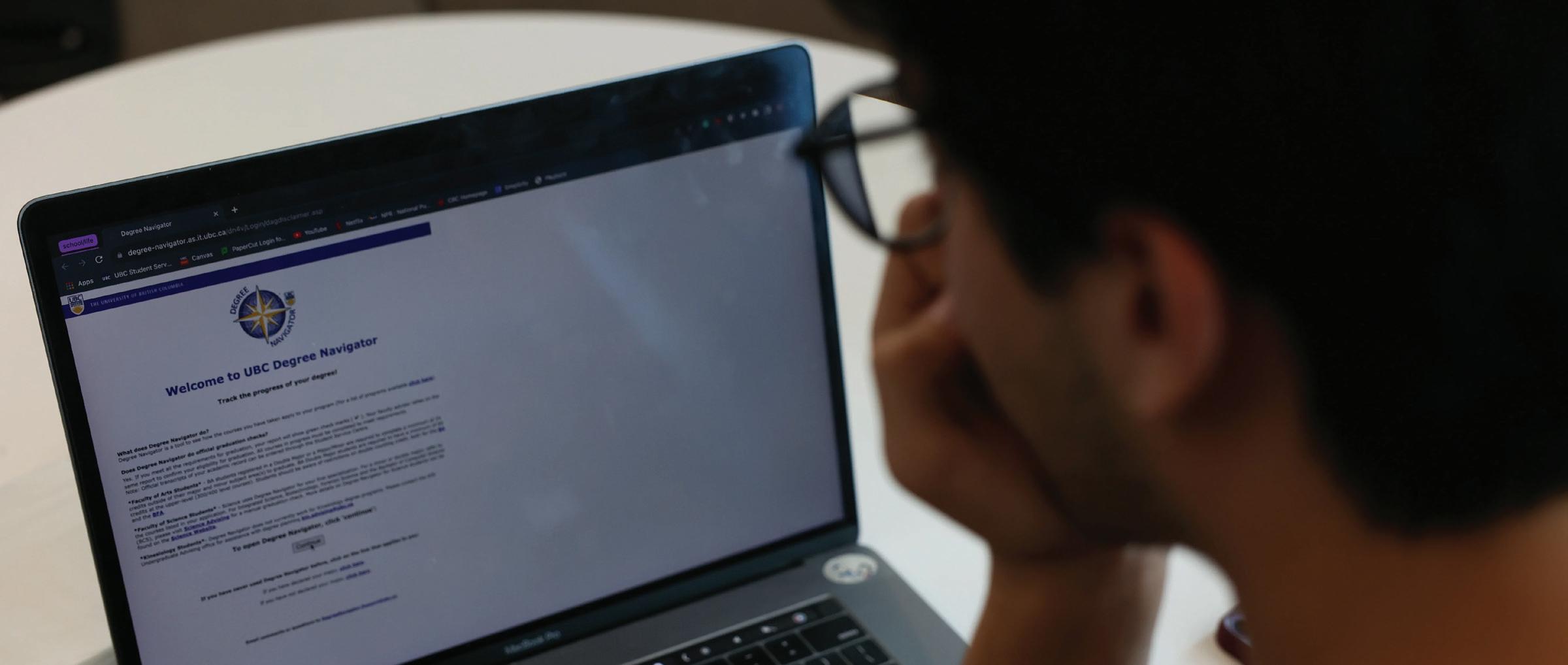
2. ANGER
“Do you even know who you’re dealing with? Hello? UBC? It’s me, student 14994645! Ring any bells? No? I’m the one who carried the CONS 313 group project. Still no? Surely my nightly all-nighters in Koerner Library have earned some recognition. Do
SAVE THE COOKIE STORE! //
you know how much I’ve paid in tuition?! You’ll be hearing from my lawyer ... when I can afford one. I just need to sell my textbooks from last term.”
3. BARGAINING
With the panic comes the emails.
“Hi [academic advisor who couldn’t care less], Was [mind-numbingly tedious course] actually essential for my graduation, or is this some cruel academic version of Punk’d ? Could we perhaps schedule a meeting, say, before the climate
crisis kills us all?”
Good luck getting a response from them.
Rumor has it, your academic advisor swapped the SSC for ASMR. Who knew pretending to give haircuts and tapping on tables would be less intense than handling our existential academic crises? Better not blink or you’ll miss them going viral on TikTok with “Soothing course registration sounds.”
4. DEPRESSION
Contemplating the seriousness
of your predicament, you start to think university may not be for you. Maybe you’re destined for something grander, like feeding pigeons and regretting your life choices.
You sift through countless r/ UBC threads hoping to find a kindred spirit to no avail. Desperate, you write a post (yikes), hoping someone will reply telling you the course is cross-listed and offering you a Starbucks gift card. But instead all you get are downvotes and one comment that reads “just use Degree Navigator, dumbass.” Looks like you’ll be taking that
course next summer. Now both your vacation plans and Reddit karma are tanking.
5. ACCEPTANCE
Maybe UBC won this round. But who cares if you have to extend your degree by a term (or five)? You’ll get to dodge the job market and student loan creditors. That’s valuable life experience for when you’re running from real-life loan sharks.
Graduating on time? Overrated. Everybody knows six years is the new four. U
Blue Chip needs to stay put for my mental health
monster).
But I wasn’t getting the recognition my cause deserved. I needed a new plan.
After seeing something about censorship, I discovered “news.” Apparently, it’s a dying medium that’ll publish anything to stay afloat. Then it hit me: Blue Chip is both “any” and “thing”!
I spent weeks pouring my blood, sweat and tears into an email to CNN, Buzzfeed, New York Times, The Onion and The Ubyssey, but email@cnnbuzzfeednyttheonionandtheubyssey didn’t respond.
So I snuck into a top-secret reporting society initiation that would allow me to write my own article. I studied and waited for months before gathering the courage to send the pitch, which I had cleverly disguised as some nonsense about tuition increases. After some head-nodding at the editor, it worked. I have brought Blue Chip to its highest peak: this article.
A massive injustice has taken place that will change the lives of all UBC students and staff permanently.
Blue Chip is being relocated.
Blue Chip will no longer beckon students exiting the bus
loop with coffee, cookies and overpriced scones for the perilous journey to class. The friendly face (cafe) that was the first sight of any commuter will soon be tucked away into a deserted crevice on the other side of the Nest, from which not even Pie R Squared returned. Walking another 45 seconds
for caffeine is like buying textbooks after paying tuition — it’s not fair.
And what will be in Blue Chip’s place? An unnamed Mediterranean restaurant? It haunts the minds of coffee lovers and Blue Chip advocates alike (because they are the same people). You can’t drink hummus, and it
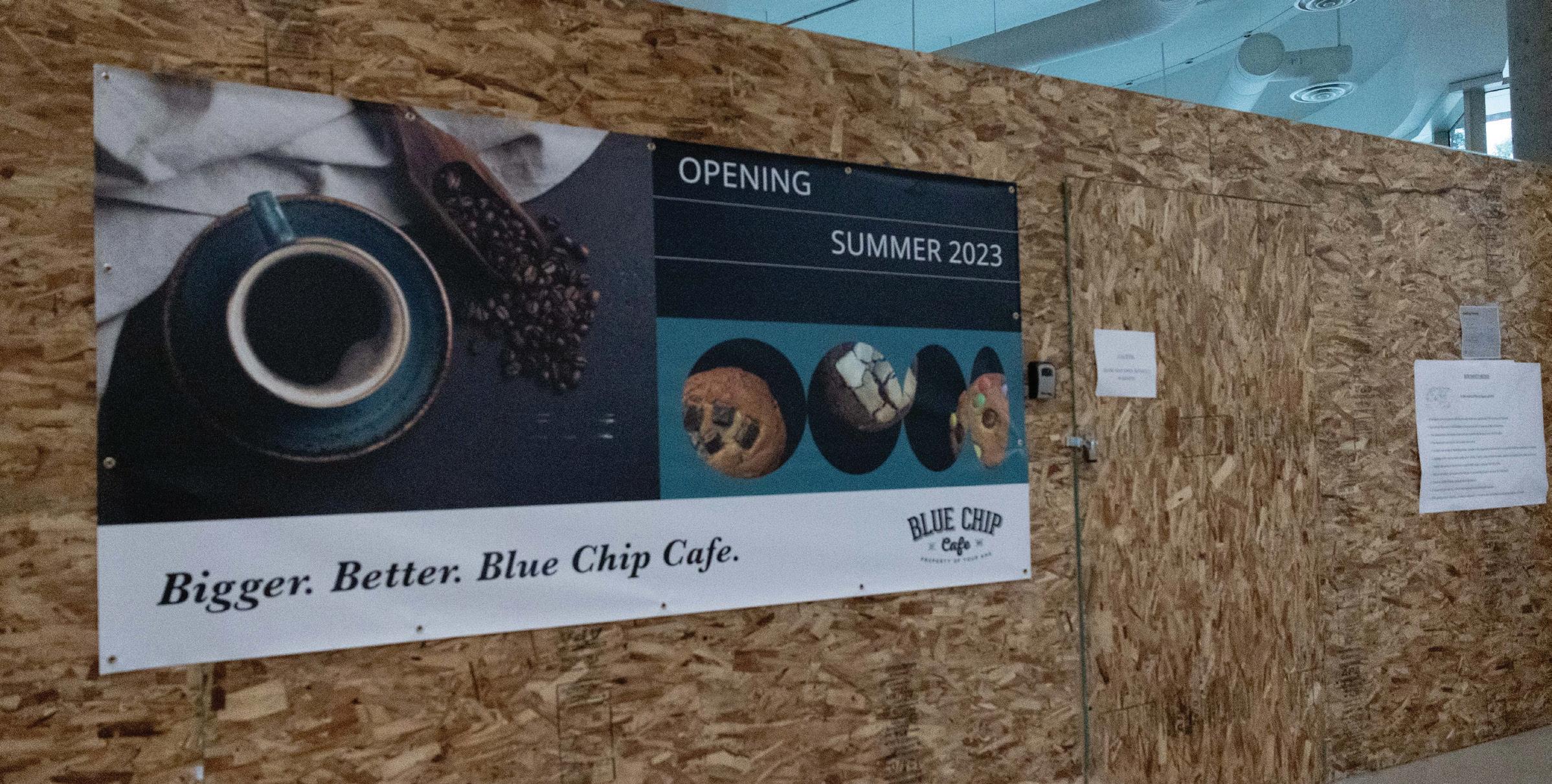
doesn’t even have any caffeine! Justice must be served.
I took my cause to the streets and compiled a petition to present to the student body. I stood in front of the Nest, kicking notBlue-Chip coffee out of the hands of passing students. No one drinks anything but Blue Chip on my watch (except Tims — I’m not a
Which brings us to the present. Read quickly — I don’t know for how long this article will remain in print. Word on the street is that the opening of the new Blue Chip location has been pushed back. Their spies must have seen my work and wish to join my cause. I know they’ll be contacting me soon. You might not hear from me again, but know that I am fighting the good coffee fight. Blue Chip will return. U
EDITOR JOCELYN BAKER HUMOUR SEPTEMBER 26, 2023 TUESDAY 10
WHAT YEAR OF THIRD-YEAR STANDING ARE YOU ON? //
How can you trust a website still stuck in its dial-up era?
ISA YOU / THE UBYSSEY
Walking another 45 seconds for caffeine is like buying textbooks after paying tuition — it’s not fair.
RENÉE ROCHEFORT / THE UBYSSEY
Sonali Sharma
Contributor
MY THAT PERSON IS VP STUDENTS AINSLEY CARRY //
Why is that person everywhere?
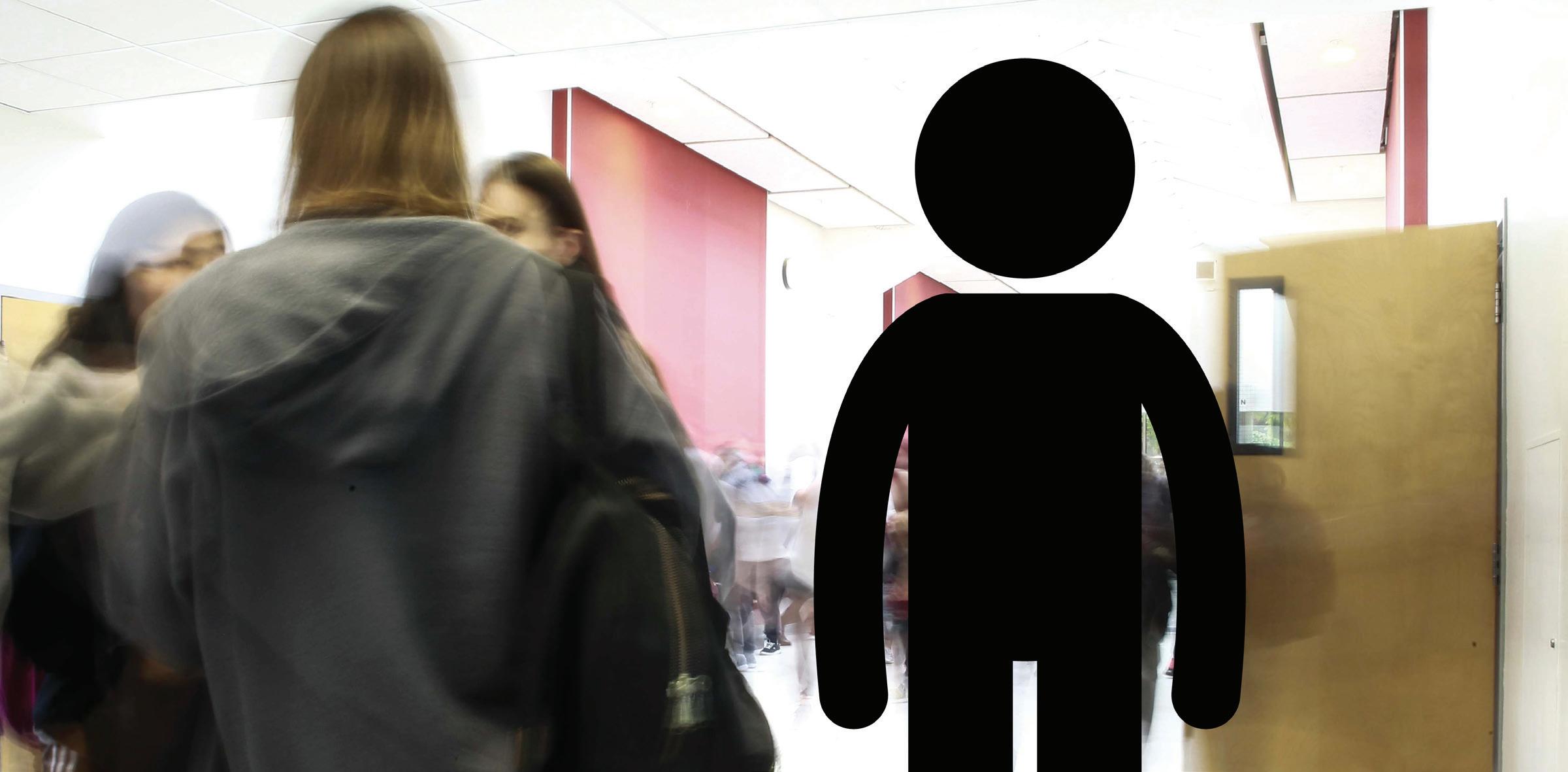 Akanksha Pahargarh Contributor
Akanksha Pahargarh Contributor
You’re walking to class. The semester just started and you’re filled with hope for the new school year. Maybe you’ll actually stay on top of things, maybe you’ll actually like your professor, maybe you won’t dread going to class everyday — who knows, weirder things have happened. You’re about to get to your class. You turn the corner. And standing right in front of the door is that person
You know who I’m talking about: the person you haven’t actually talked to before but for some reason see everywhere. You noticed them in your first year because they would shout way too personal stories at full volume in the dining hall, and ever since then you can’t go anywhere without them spawning next to you.
Are they following you? Are you following them? Is it all a coincidence? It’s too weird to be a coincidence, though. How are they always there even though they have no classes with you, don’t know any of your friends and you don’t even know their first name?
You start to sense their presence — there’s a weird feeling in your stomach, as if something’s about to happen, and when you turn around they’re standing
behind you talking about jazz. Do they notice you everywhere too?
Are you that person for them? You try to forget seeing them, but you can’t shake that icky feeling.
Realistically, you know it’s not that deep — they probably have a class in the next room or know someone in yours — yet your mood still drops and the small
sliver of hope you had for this year fades. Why does this random person affect you so much?
Maybe they remind you that this year is no different from the last, or maybe you feel uneasy with the fact they’ve probably noticed you hanging around, and this stranger perceiving you makes you uncomfortable.
Internal reflection about your anxiety won’t help. The only thing to do is plead with the universe that by next class, something will have happened that ensures they won’t appear within your vicinity anymore. Maybe they’ll drop out or get abducted or win the lottery on the condition that they move to Liechtenstein. You know it’s a
pipe dream, but it’s all you’ve got.
We’re all haunted by that person . And perhaps we are all that person for someone else. The most important thing to take away is the profound philosophical revelation that to be seen i— Oh shit, fuck, they’re right there. That person is RIGHT THERE. U
Fall date ideas for you and your pumpkin spice latte
TAKE A POTTERY CLASS
Both 4 Cats Art Studio and U Paint
I Fire are close to UBC and perfect for some wholesome crafting. Create beautiful pieces that your mom will pretend to love and then toss in a closet with the rest of your kindergarten artwork because it messes with the flow of her nautical-neutral kitchen.
EAT A GREAT DANE JEREMY SANDWICH LADY AND THE TRAMP STYLE
Woof woof.
FALL CAROLLING?
What constitutes a fall song? “Monster Mash,” to name one. Interrupt lectures full of people you hate (because true love is just having a lot of shared enemies) with karaoke (or acapella — sing your truth) versions of this classic hit.
misery of others. Is this illegal? I have no idea. We suggest picking a rainy day for maximum doom and gloom.
GIANT LEAF PILE (INSIDE)
The long-lasting insect infestation is a constant, scuttling reminder of your true love.
Kyla Flynn
Senior Staff Writer
It’s fall. You’ve pulled the little carpet beetles off your knit sweaters and are actually pretty close to buying a working umbrella after yours was eaten by the Orchard Commons wind tunnel. The leaves are yellow, maybe red(ish), and you’ve made a playlist titled september (lowercase s, of course) which is just Red (Taylor’s Version) . Coincidentally, your roommates have already placed a hard ban on “All Too Well (10 Minute Version)” because they are taste -
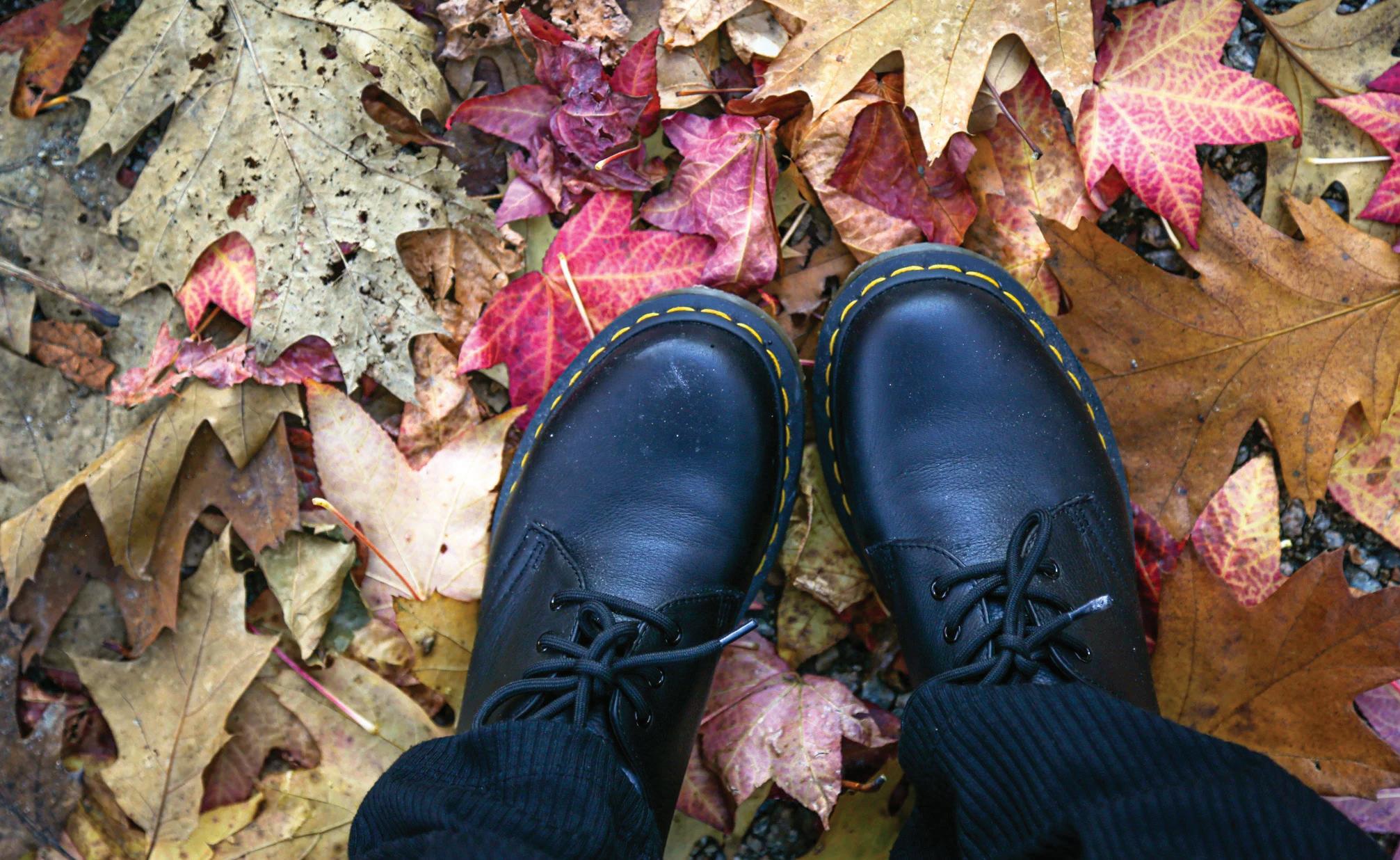
less and spiteful little hobgoblins who hate joy.
All this to say, ‘tis the season for really cute coupley shit. Like, absurdly wholesome dates jampacked with pumpkin spice, golden hour, pampas grass, burgundy shackets and everything your Gilmore Girls -fuelled fantasies are made of.
UBC APPLE FEST
If you haven’t taken your situationship to Apple Fest, you probably made them up. This annual event is the quintessential small
town autumn fair vibe. Feed your partner exotic apple varieties in the Tasting Tent, or adopt an apple tree together — which is pretty much one step away from a marriage proposal if you ask me. Visit the festival October 14–15 this year.
VISIT A PUMPKIN PATCH
This is a classic. Try to absolutely windmill slam dunk on the other couples by filling your wheelbarrow with all the biggest, best, most rotund pumpkins. Bam. You just won pumpkin patching, baby.
RAKE MAIN MALL
Looking for an autumnal workout? We at The Ubyssey suggest taking a big ol’ rake and getting at those leaves that are about to start coming down en masse. For an extra level of difficulty — who doesn’t love a good relationship challenge — try doing it as people walk between classes from 11:50 a.m.–12:00 p.m.!
PUT FAKE PARKING TICKETS ON EVERY CAR
For the couples who thrive on the
TRAIN THE
CAMPUS COYOTES AS SLED DOGS BUT FOR A HAYRIDE
Nothing like a classic Vancouver side hustle to bring your relationship to the next level. This seasonal activity is sure to be a hit for students of all ages, faculties and backgrounds. Looking to take it to the next level? Collab with UBC Student Tours to entice prospective undergraduate students with the promise of adopting one of the coyotes once they’ve been freed from the literal chains of your enterprising endeavours.
FILL THE
FOUNTAIN WITH PUMPKIN SPICE LATTES AND GO FOR A SEXY SWIM
The bookstore Starbucks line is pretty short this time of year, so they’ll have time to craft the 274.2 venti PSLs you’ll need for this affordable and accessible date night. Recruit some other couples looking for a good time to help you drain the fountain, bucket-by-bucket, before refilling it with everyone’s favourite Pinterest-worthy beverage. Romance at its finest. U
SEPTEMBER 26, 2023 TUESDAY | HUMOUR | 11
You’re about to get to your class. You turn the corner. And standing right in front of the door is that person
TAG
@UBYSSEYHUMOUR
PHOTO ELIZABETH WANG / THE UBYSSEY, DESIGN JOCELYN BAKER / THE UBYSSEY
US
WITH YOUR INDOOR LEAF PILE //
‘Tis the season for really cute coupley shit.
JASMINE FOONG / THE UBYSSEY
A knife? No!: UBC Volcan forges blades and community
Regina Hipolito Contributor
Ever wonder what goes into making a sword?
UBC Volcan is a studentled engineering design team that specializes in the ways of blacksmithing and forging.
The relatively new team, which started in 2020, fuses diverse histories of blacksmithing with skills gained in materials engineering courses. The swords they make never see battle. Rather, the blades themselves compete in the international TMS Bladesmithing competition, where they are judged on creativity and difficulty.
According to co-presidents Connor Gingera and Kerrie Ye, their blade designs come to life from team members’ ideas. Each idea is then voted on by the entire design team based on creativity and practicality.
Projects revolve around applying knowledge from upperyear materials engineering courses. The chosen idea typically goes through a series of engineering tests and material selection processes.
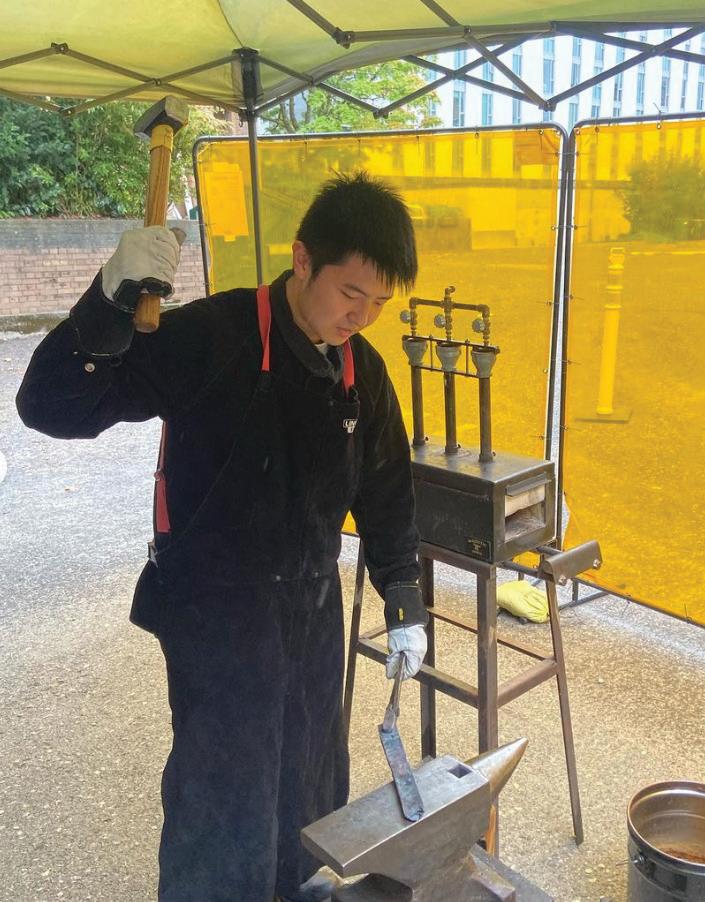
This starts with SolidWorks simulation models to plan the heat treatment, as well as looking into the microstructure of the metal to figure out the best
applications for the blade — all before going through the forge.
“We basically build out that microstructure, which is the internal structure of the steel that you can look at under a microscope,” said Gingera.
The forge heats the metal to the point of recrystallization, when the grains within the steel’s microstructure elongate and can be reshaped by pressure. Then, water is used to cool the steel into its new shape.
“The reason why we use steel for our blades is just because it’s one of the most well-understood metals,” said Gingera.
This makes it useful for blades from Medieval European arming swords (Gingera’s favourite) to Japanese katanas (Ye’s favourite).
Ye described how the team loves exploring swords from different cultures and time periods, aiming to honour their unique aesthetics and purposes.
This historical focus drew the attention of Burnaby Village Museum, which collaborated with the club to create a railroad spike butter knife (a knife forged from railroad spikes, giving it a unique spiralled hilt) to highlight a type of blade common in the early days of the Canadian railways.
While the team has a dedicated core of members,
it’s been a challenge to build a community since they started.
“It’s been a process trying to build up our team,” said Ye. “[We try] to recruit people that are really passionate … as well as look toward the future and what we want to shape.”
As an engineering design team funded by the Faculty of Applied Sciences, the recruitment process is different from a typical club, as there is no membership fee. Members are selected through an application and interview.
“If anyone’s interested in blacksmithing, being part of a team looking to design stuff for competition, or maybe the engineering behind ... what’s inside of steel … reach out to us,” Gingera said.
Despite its engineering focus, UBC Volcan is open to all students, and they pride themselves on having members from different faculties and academic years.
“There’s more to working on these projects [than engineering], and we’re very open,” said Gingera. “We have students from sciences, arts, all faculties across campus … and we’re very thankful.”
The team is recruiting for non-technical roles, such as a videographer, outreach coordinator and a project manager. U
UBC tackles microplastics crisis with tech and policy
70 per cent of microplastics found in Vancouver waters are actually microfibers, such as polyester and nylon, from our clothing.
“I don’t think people realize that … every single one of us is contributing to pollution,” said Dr. Maite Maldonado, a professor in the UBC Microplastics Cluster who is studying contaminants in the Strait of Georgia.
A study done by a postdoc student under Maldonado looks at how microplastics affect tiny, shrimp-like creatures called amphipods. When the amphipods were in environments containing microplastic concentrations 10 to 100 times more than current Vancouver waters, they could not distinguish between the plastic particles and their food and ate the plastic instead.
international plastics treaty under negotiation.
End Plastic Pollution, an international agreement addressing the production, design and disposal of plastics is planned to be completed by the end of 2024.
Dauvergne called it the biggest environmental treaty since the Paris Agreement in 2015, which led many countries (including Canada) to implement a single-use plastic ban to decrease plastic consumption and pollution.
However, some single-use plastic bans pose a problem for people who rely on plastic straws for accessibility reasons. Alternatives such as glass, paper or metal straws can pose safety hazards.
Dauvergne urged decision makers to centre justice when discussing the international treaty.
Elena Zanuzzi
Contributor
Welcome to the age of the ‘Plasticene’, a world so infected with plastics that they’ve embedded themselves in our fossil record. Microplastics are infiltrating global water systems, causing scientists, activists and governments to sound the alarm.
UBC researchers are providing valuable information and solutions, including a filter made of wood products to remove plastics from water.
UBC’s BioProducts Institute recently collaborated with scientists at Sichuan University in China to develop a device that filters out vir-
tually all microplastics from water. Made by combining wood dust with tannins, a natural plant compound, bioCap is a sustainable solution to protect ourselves from microplastics accumulating in our bodies.
In an interview with the Vancouver Sun, Dr. Orlando Rojas, the lead researcher and a professor for Chemical and Biological Engineering at UBC, said that production and sales of bioCap depends on whether companies decide to invest in it.
Dr. Rojas did not respond to The Ubyssey’s request for comment by publication time.
While we wait for bioCap to make it into the market, UBC re-
searchers commented on microplastics in Vancouver waters and how negotiations for international plastic and microplastic regulations are more complex than ideal.
MICROPLASTICS IN VANCOUVER
Plastics inevitably release microplastics: small pieces of plastic between one micron to five millimeters in size. It is estimated that about eight million tonnes of microplastics are released each year, making their way into our oceans, food systems and bodies.
It might be expected that degrading plastic litter is the biggest contributor to microplastics, but about
The microplastics eaten by the amphipods would stay in each predator’s body, working its way up into food sources and ultimately into human bellies — something that is already being observed by scientists.
Currently, there seems to be no significant damages caused by microplastics to Vancouver’s watersheds, but Maldonado warns that the future is grim if microplastics continue.
PLASTIC REGULATIONS
According to Maldonado, federal government regulations are the only way to force companies to produce less plastic and dispose of it more responsibly.

Dr. Peter Dauvergne, a UBC professor of global environmental politics, shared insight on an
“Whenever you get an agreement around something as complex and multi-layered as this plastics crisis, you’re going to have ... the potential to cause environmental injustices and create harms for people that you aren’t expecting might be in the way.”
Maldonado encourages people to buy used clothing and to do less laundry to reduce the amount of primary microplastics shed from our clothing, but it remains difficult to completely prevent the release of microplastics in our everyday life.
Until our materials systems change, tech like bioCap might be the most reliable way to protect ourselves.
“It may be too hard to regulate it,” Dauvergne said. “It may need to be done through technological upgrading.” U
EDITOR TOVA GASTER SCIENCE SEPTEMBER 26, 2023 TUESDAY 12 DUEL TONIGHT, QUEEN? //
YUM, MICROPLASTICS //
While other engineering students went to class, UBC Volcan members studied the blade.
PHOTO COURTESY @UBC VOLCAN
Welcome to the Plasticene.
ZOE WAGNER/ THE UBYSSEY


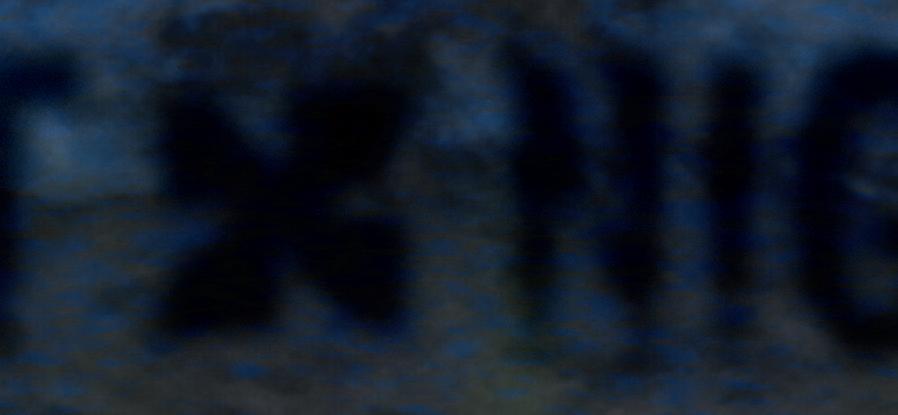
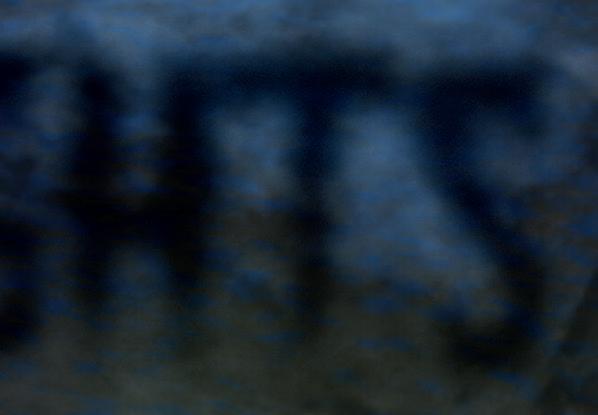










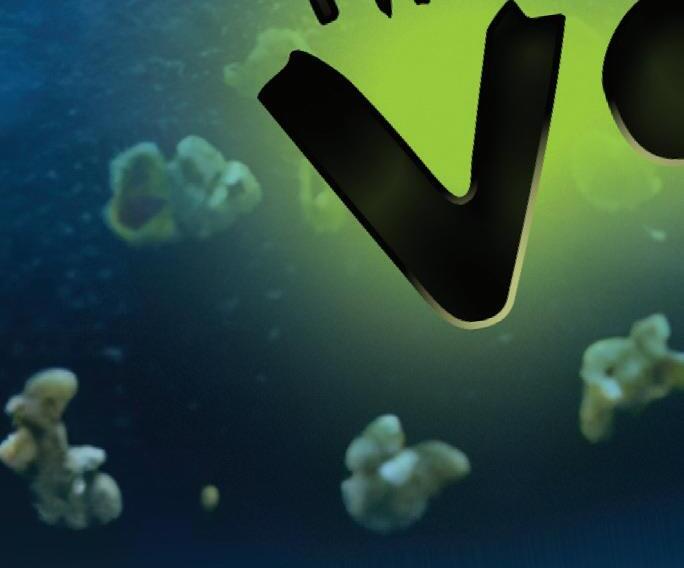



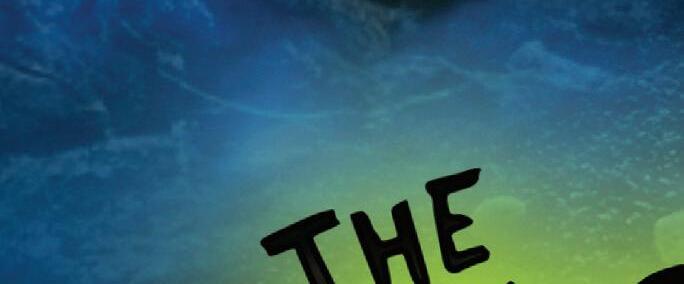



OCTOBER 6-31 AT PLAYLAND — 20 yeArs of FeAr — Thrilling RIDES. Haunted Houses. Total Nightmare! OPENING WEEKEND TICKETS: $30 frightnights.ca Brave the New haunted house you’re not alone ADVERTISEMENT
Thunderbirds use strong second half to defeat Alberta 54–37 at Homecoming
by Caleb Peterson
As the sun set over the sold-out Homecoming crowd at Thunderbird Stadium on Friday evening, the T-Birds proved they are championship contenders, toppling the previously undefeated University of Alberta Golden Bears 54–37.
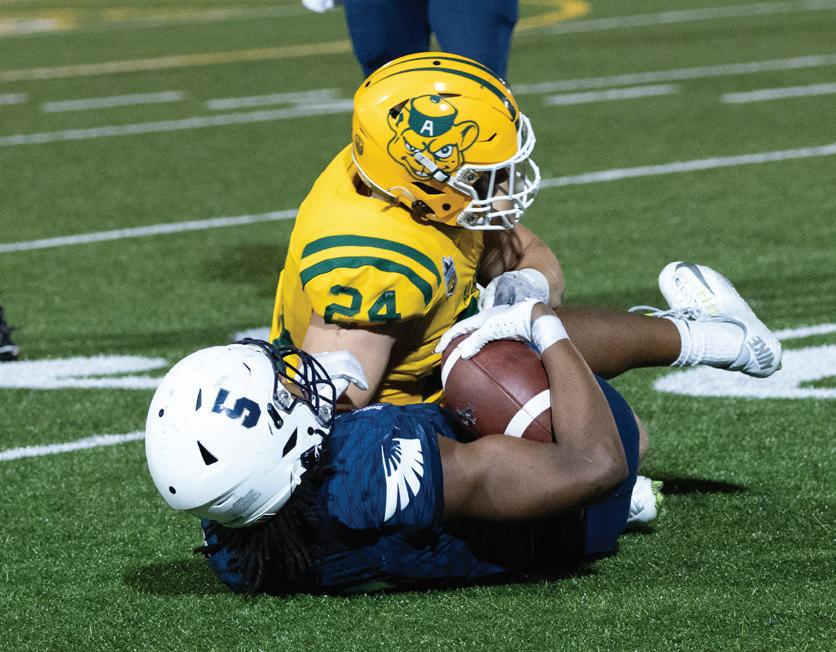
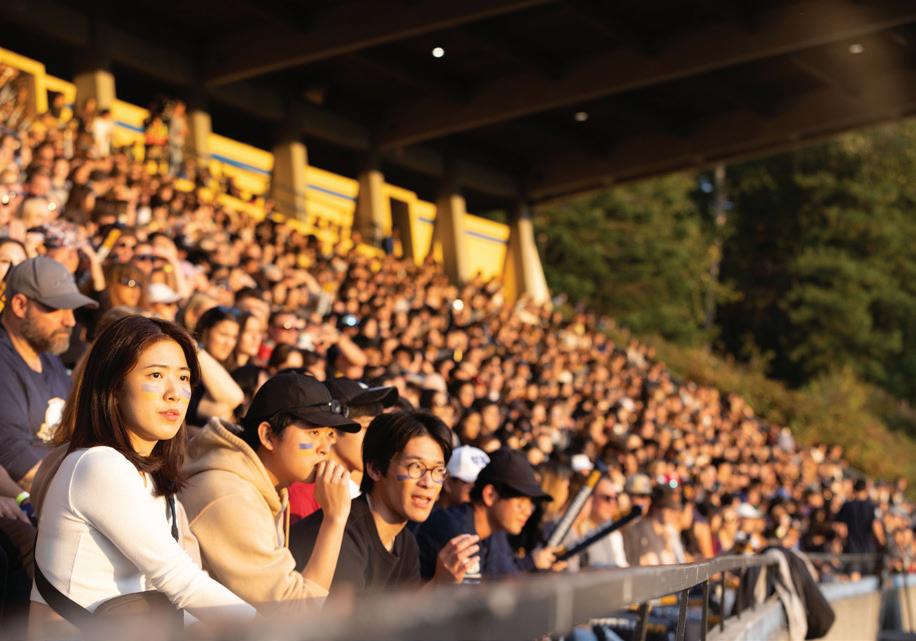
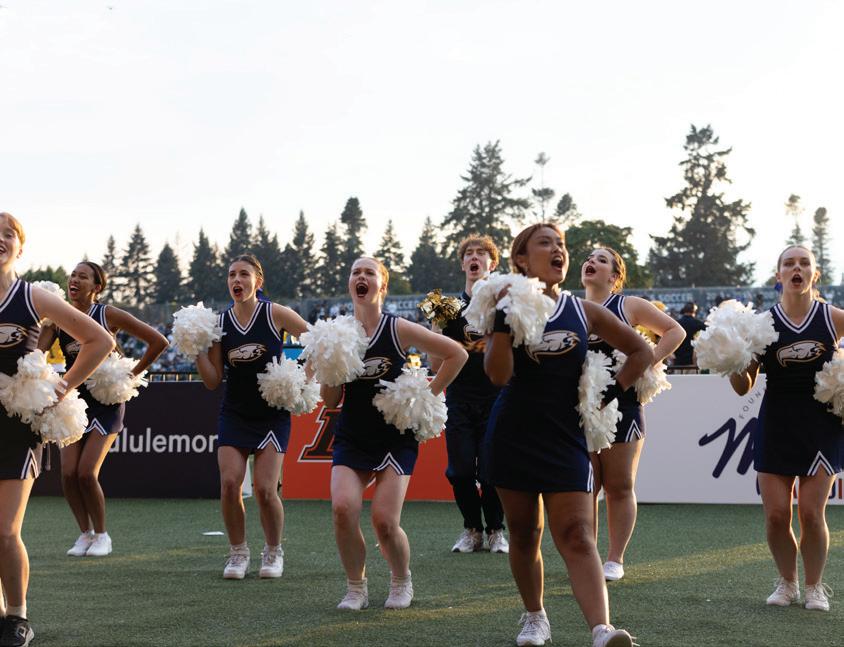
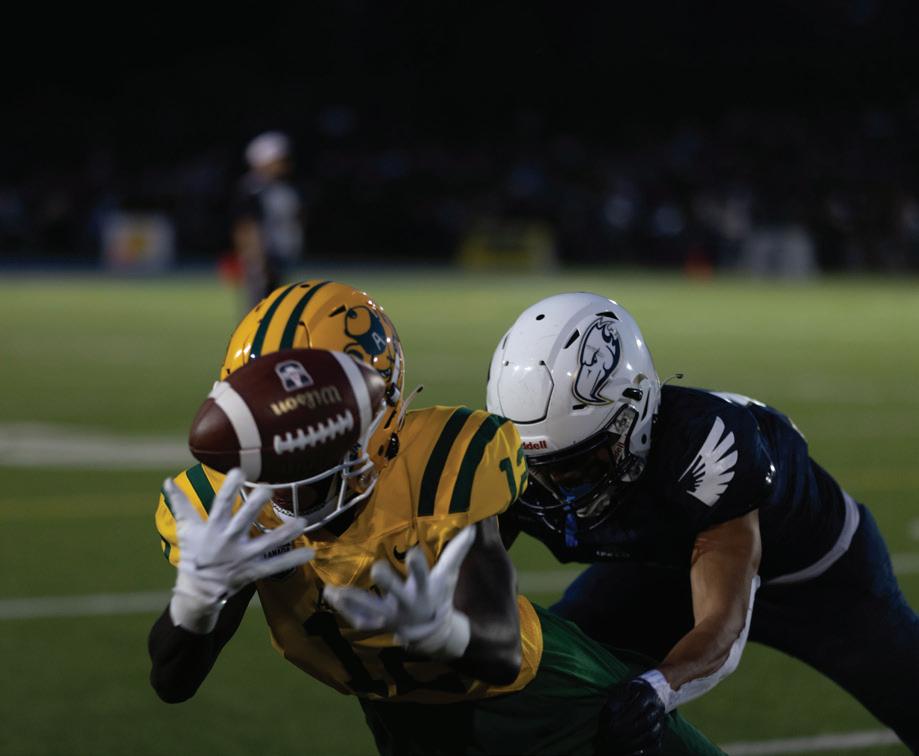
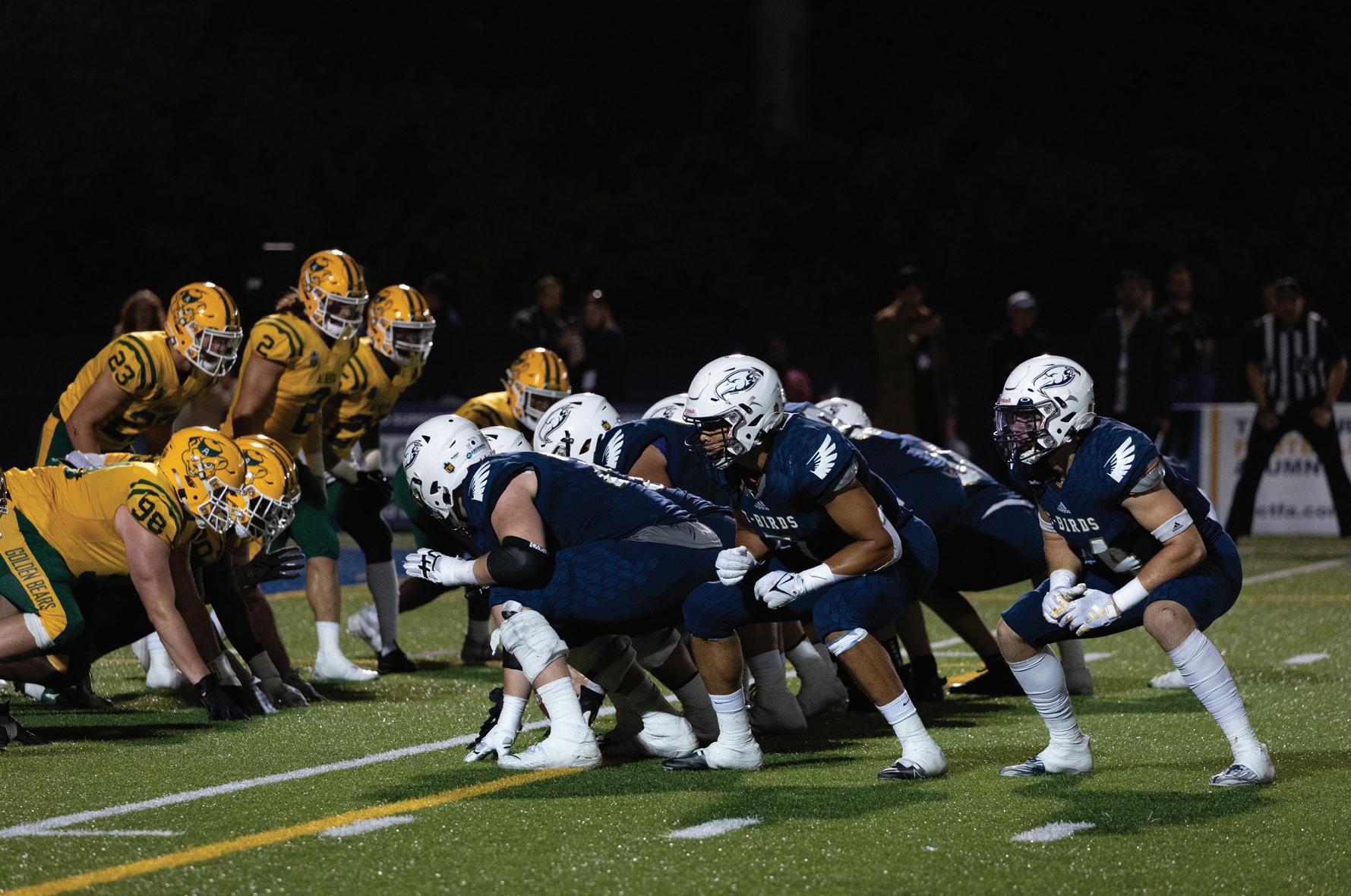
Despite the victorious ending, the ‘Birds didn’t begin with a bang. Alberta got on the scoreboard first, taking advantage of a blown coverage to get inside the red zone and ultimately scoring a touchdown. The Thunderbirds only mustered a field goal in response, exiting the quarter down 7–3.
The offensive spark the T-Birds needed came from quarterback Garrett Rooker. With protection from his offensive line, Rooker threw a pass to Shemar McBean, who had blown past two Alberta defenders for a 38-yard score.
A field goal from the Golden Bears tied it up, so the Thunderbirds made another big play.
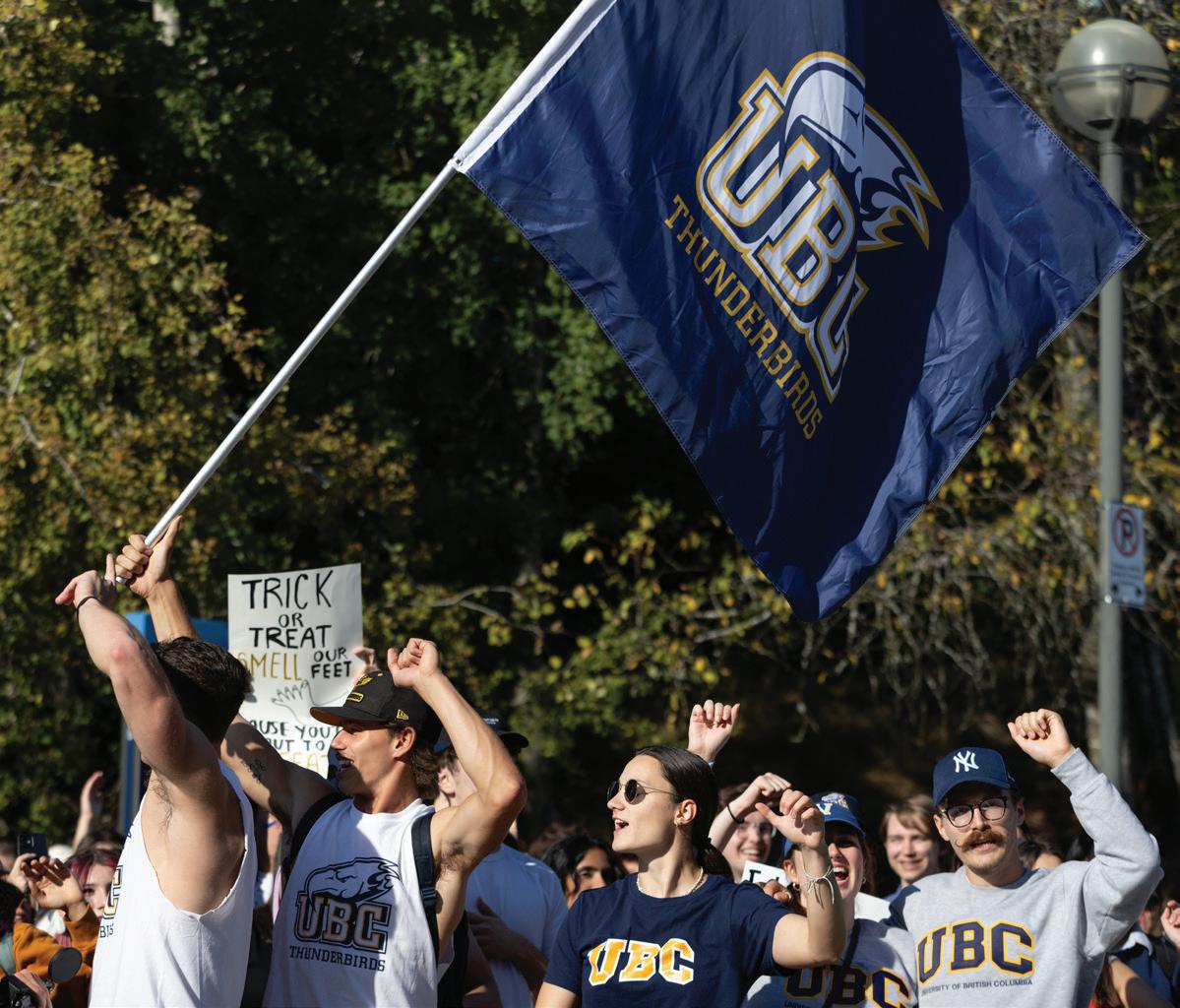
Instead of pushing the pile ahead to gain another first down on a 2nd and inches, running back Dane Kapler took the handoff and cut outside all of his blockers, causing Alberta defenders to miss. He then changed direction, dodging the defence to find almost 50 yards of open space for a go-ahead touchdown.
Photos by Isa You and Zoe Wagner
Kapler’s run seemed to spark the T-Birds, creating a 24–10 lead after Rooker ran five yards during their next possession for a touchdown. The T-Birds sat on that lead up to the half, going into the locker room with a score of 27–19. But the advantage didn’t last long.
Alberta star offensive running back Matthew Peterson used his breakaway speed on a 95-yard halfopening touchdown, bringing the Bears within 1 point and putting UBC on red alert.
While plays like that can shatter a defence’s confidence, UBC showed their resilience. For the rest of the second half, the ‘Birds only allowed 10 more points, stifling Alberta’s attack to let the T-Birds offence take control of the game.
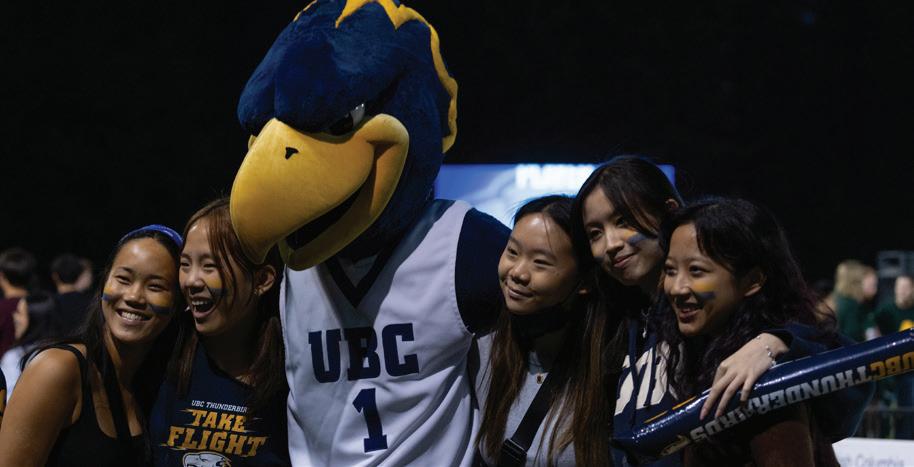
UBC head coach Blake Nill praised his defensive coordinator, Pat Tracey, for the turnaround.
“He doesn’t line up in a traditional defence. His cerebral involvement [and] his game planning [are] not typical and it messes up offenses … I’ve said this for the nine years we’ve been together here. Pat Tracey and his staff give us a chance to win every game,” Nill said.
Even with excellent defence, the ‘Birds still needed some points to secure a win. While it looked like
the offence was starting slow after Peterson’s touchdown, a perfectly executed fake punt, resulting in a 49-yard rush, created momentum.
From there, Rooker took over, throwing two more touchdowns both of 25 yards or further, adding on to the excellent deep ball play that he established in the first half. The T-Birds’ offence was
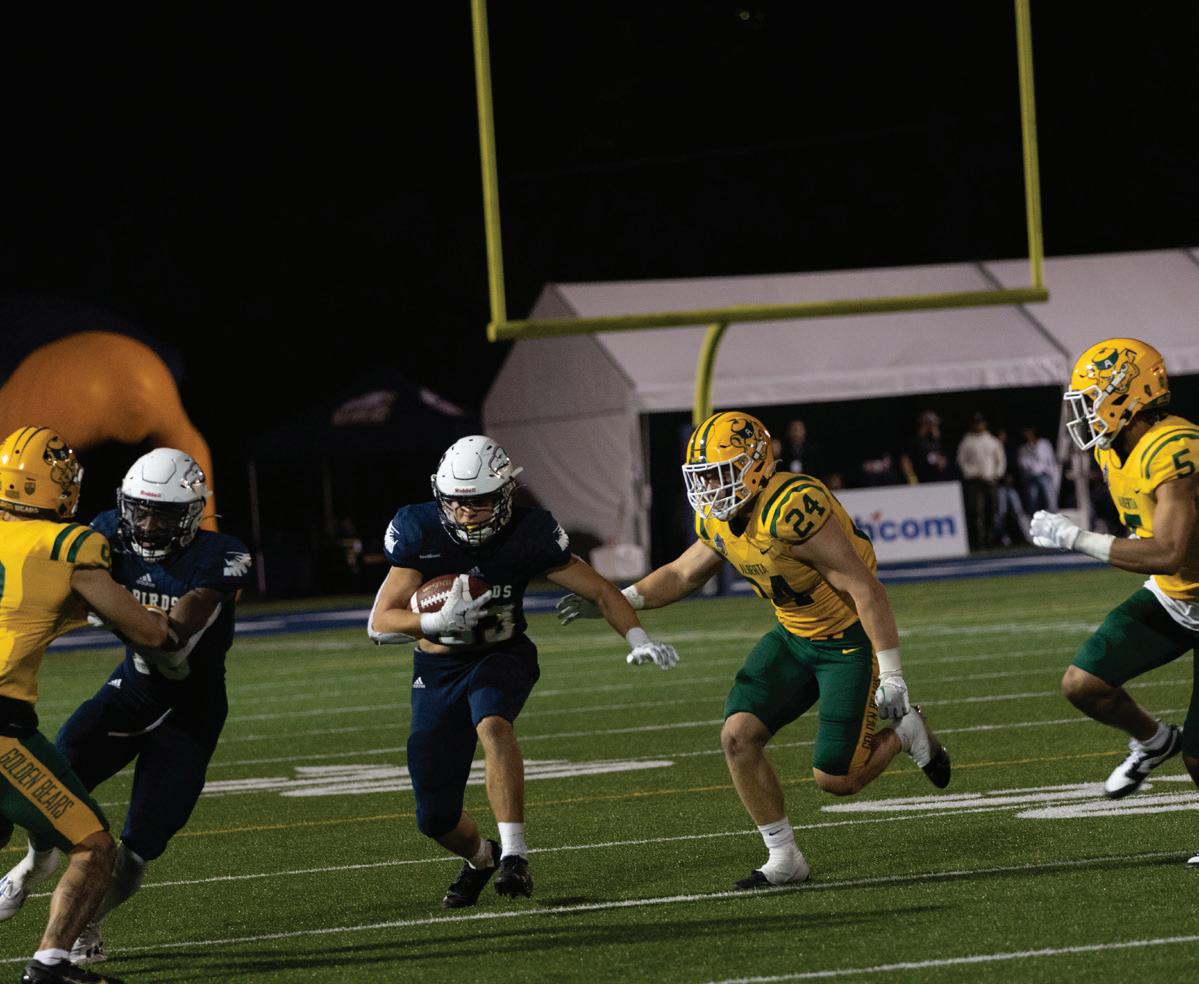
operating on the highest level it has all season, and Nill was impressed.
“The O-line is pretty dominant. We can protect Rooker and teams are going to have to start pressuring us and win a lot of man coverage. I know I wouldn’t want to be playing too much man coverage versus this group of
receivers.”
With the victory, the Thunderbirds moved to a perfect 4–0 record on the season for the first time since 1992, putting them in first place of Canada West. They will look to stay undefeated when the ‘Birds travel to face off against the University of Saskatchewan Huskies on Friday. U
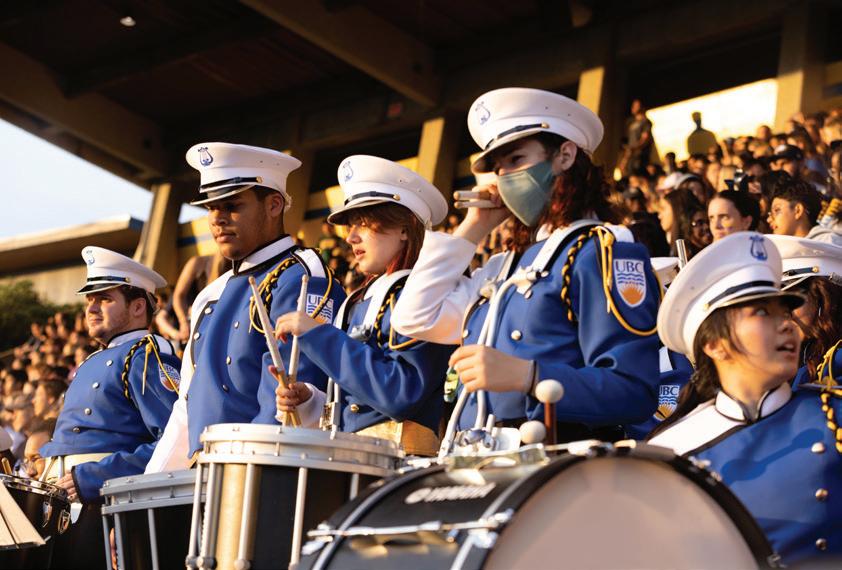
EDITOR LAUREN KASOWSKI SPORTS+REC SEPTEMBER 26, 2023 TUESDAY 14 BEARS. BIRDS.
GALLATICA //
BATTLESTAR
Words
BLUE! GOLD! U-B-C! //
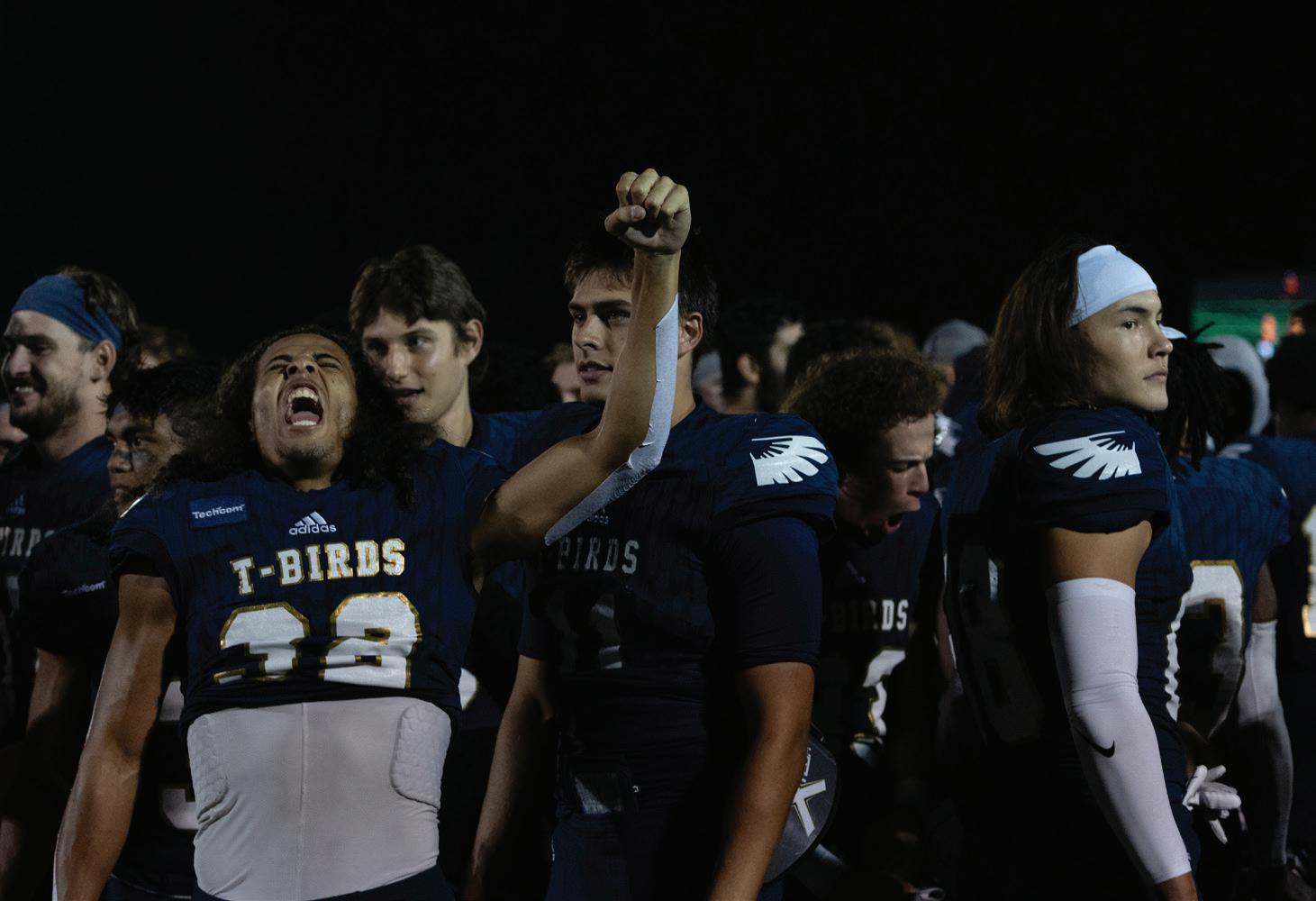
UBC Cheer is bringing cheerleading from the sidelines to the spotlight
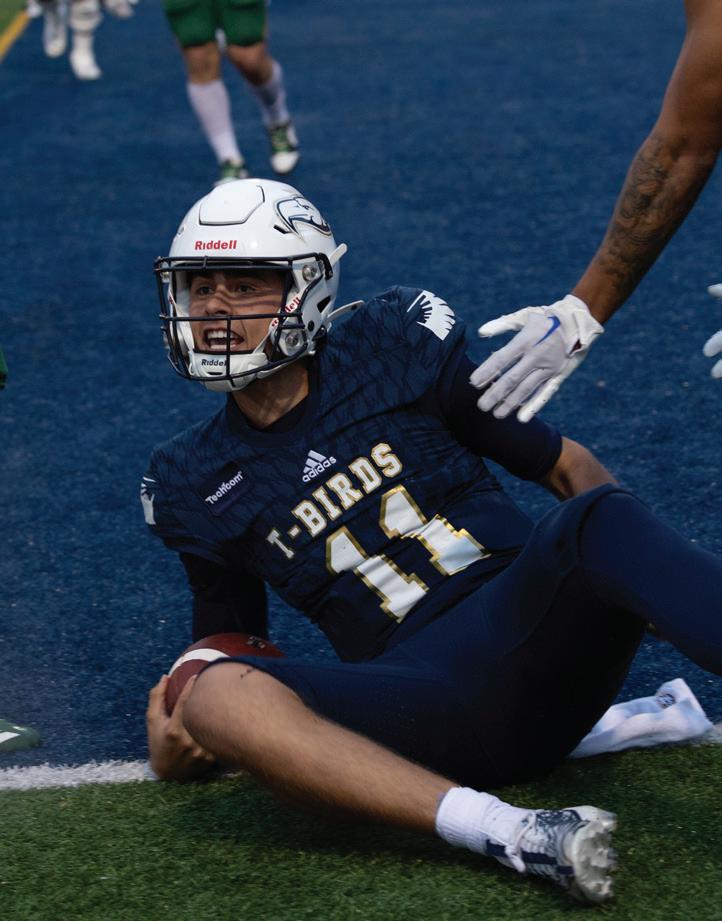 Stella Griffin
Staff Writer
Stella Griffin
Staff Writer
Too often, cheerleading is stereotyped as girls just waving pompoms. But the UBC Cheer Club shows just how physically and mentally demanding a sport cheer really is at competitions across the Lower Mainland.
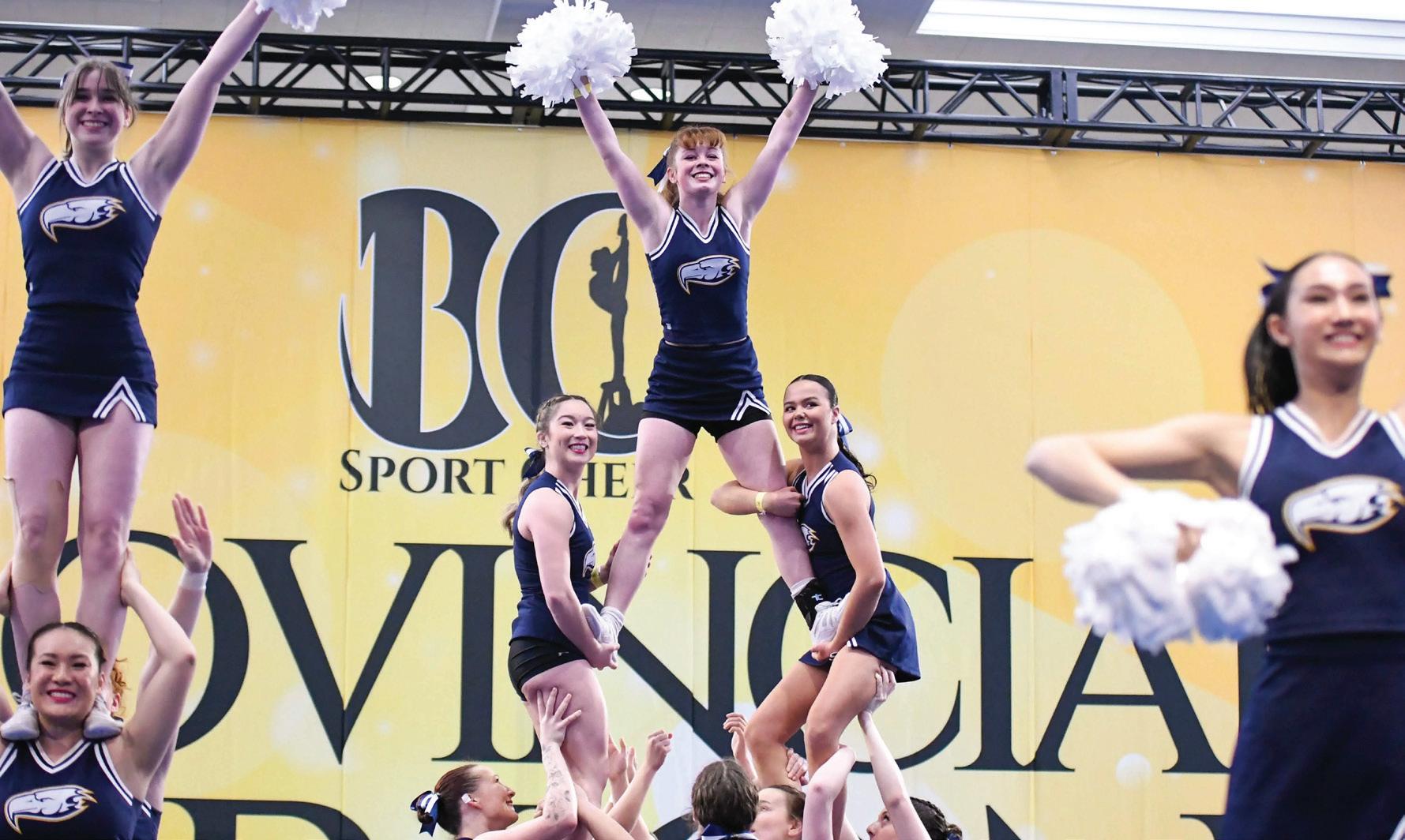
Emma Quan, a fifth-year base on the team, emphasizes that what makes a good cheerleader is athleticism and a mentality of “wanting to grow and improve.”
The cheerleaders on the team come from different athletic backgrounds, ranging from All-Star cheer to gymnastics to rugby, and all train six to seven hours a week.
“Especially collegiate level competitive cheer [demands] … the diversity of athleticism that you need to have because it’s not just dance,” she said. “There’s the performance part of it, there’s endurance, there’s strength, confidence [and] memorization that make up a cheer routine. I think that can surprise people. They’re like ‘Oh, you’re not just waving pompoms?’ No.”
“There’s an expectation that we are working on ourselves individually, to keep improving our strength or endurance or flexibility outside of practice as well,” said Quan. “Because practice is meant to be teamwork time.”
Being a team player is a key
“Just because we don’t take a ball doesn’t mean it’s not a sport,” said Fuenning.
aspect of cheerleading and one that helps keep everyone safe. Teslyn Buehler, a second-year flier for the team, speaks of the trust she places in her stunt group when she flips above them.
“If somebody doesn’t do their job exactly right, it just doesn’t work out, because I’m up there … they’re holding me and my job is [to trust] that they’re going to catch me,” Buehler said. “If one person doesn’t show up
to practice … your stunt can’t go. It’s not like, ‘Oh, we’ll just do it.’ It’s the teamwork. That makes it really special for me.”
Although teamwork is necessary for the execution of their routine, it also creates a sense of community. During a game in Quan’s first year on the team, it was pouring rain.
“We were absolutely drenched … it was one of those things where
that should have been miserable.
It was cold. It was wet,” Quan said.
“But it was so fun, because everybody made it so fun.”
Program co-directors and coaches of UBC Cheer Lana Fuenning and Melanie Martens work hard to create a positive team environment.
“That was something we never wanted to compromise,” Fuenning said. “We never wanted to push
other things [like] skills or difficulty, if it meant that we’re putting [togetherness] to the side.”
Fuenning and Martens competed together on the University of Victoria cheer team and are now both graduate students at UBC. During their years as athletes, they’ve had some negative experiences with coaches and hope to change that narrative for their team.
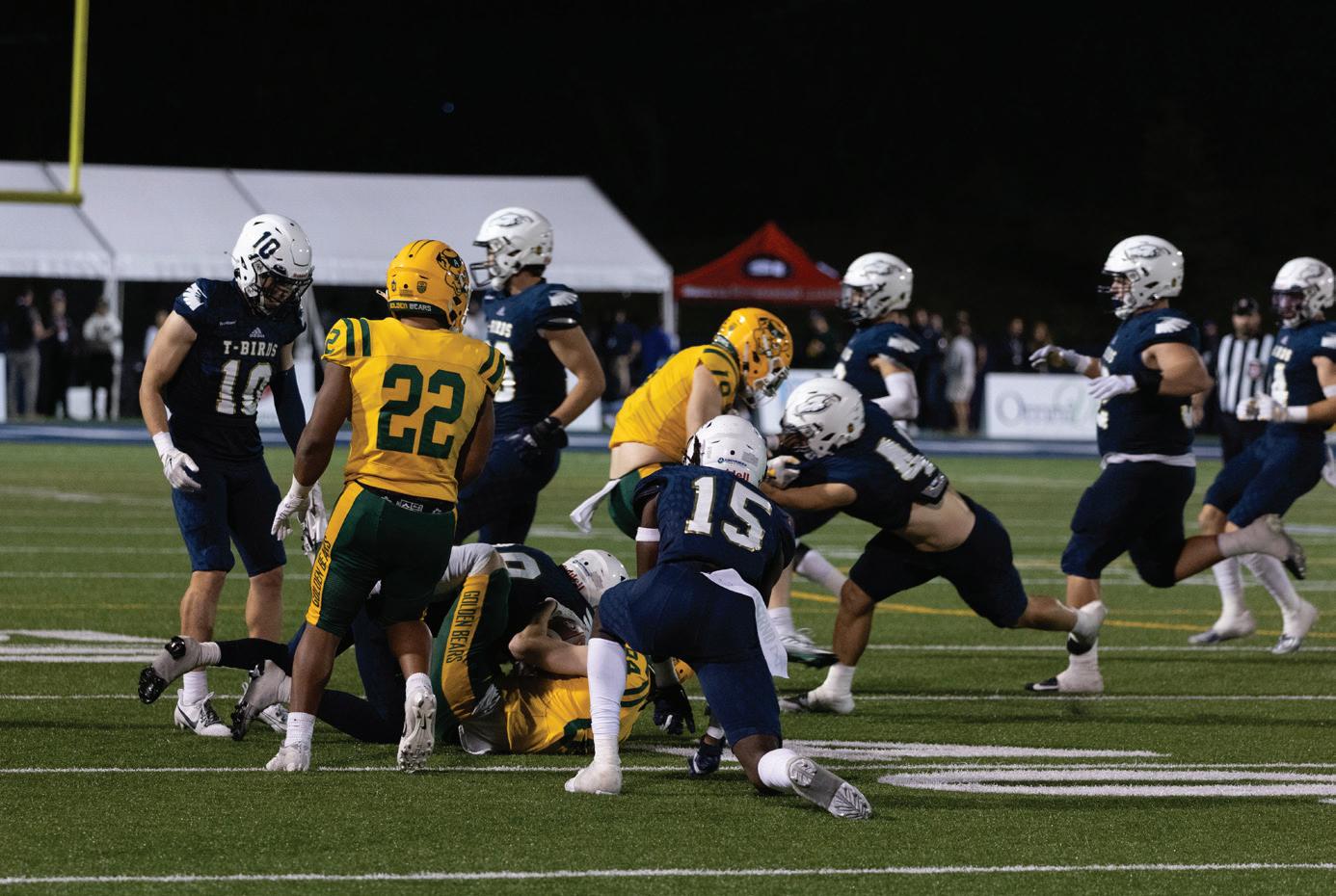
“I think as pretty young coaches … we can still very much relate to our athletes and I feel like it hopefully negates as much as it can that power dynamic that can sometimes exist in coaching,” Fuenning said.
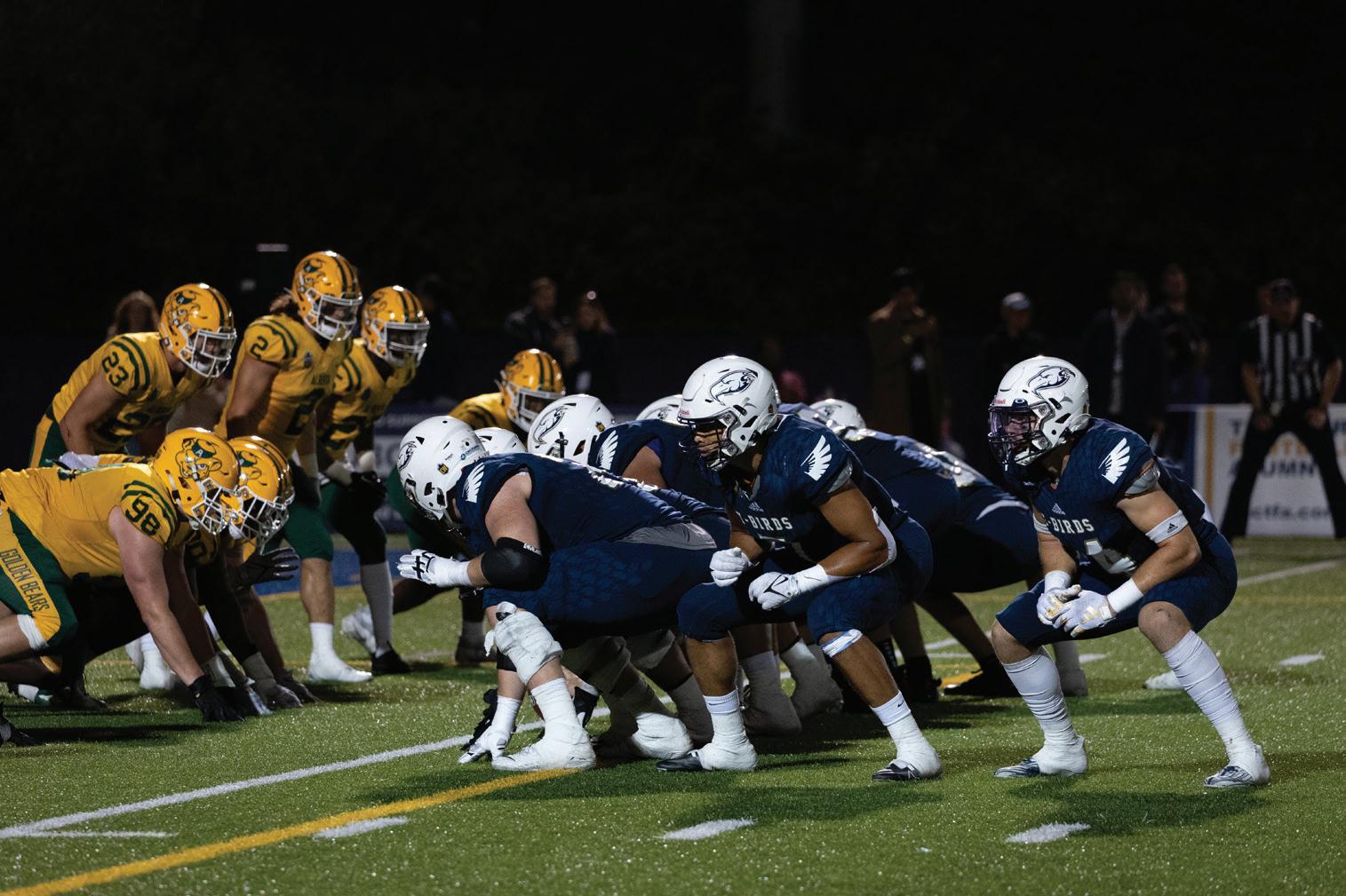
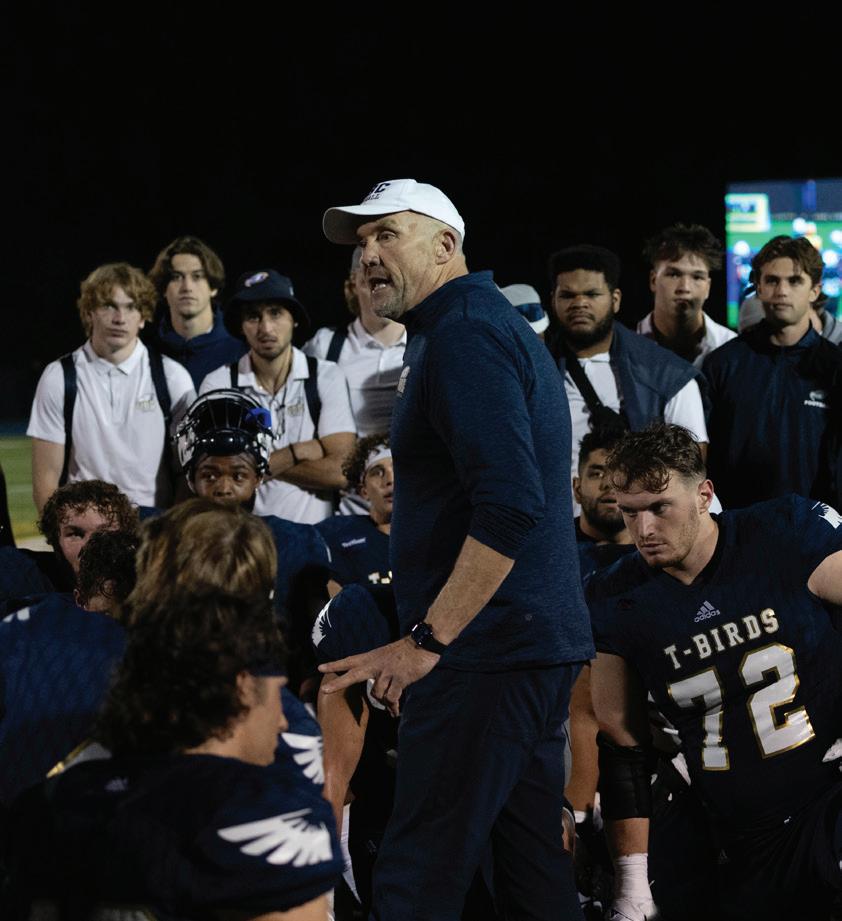
With the start of the new season, Fuenning is looking forward to redefining people’s view of cheer and the team in the UBC community.
“The past few years, the team has been handed from coach to coach to coach, and I think a lot of things have fallen through,” she said. “What we’re trying to do is to pick up all those pieces and put it together so that [UBC Cheer] is a functioning team and is able to contribute to the community and be more active and seen.”
“Just because we don’t take a ball, doesn’t mean it’s not a sport. That’s been a big thing that I’ve had to drill into people,” said Fuenning. U
— With files from Eliza Mahon
SEPTEMBER 26, 2023 TUESDAY | SPORTS+REC | 15
MICHELLE ROBERTS
1. Jacuzzi
2. Aesop's race entrant
3. Bakery fixture
4. Left on a map


5. 1976 title role for Sissy
32. Sand bar
33. Work out
34. Rubbed out, gangster style
36. Winter forecast
37. Protective gear Special forces unit
Part of WWW
Reader's ___
Expects; anticipates Prize money
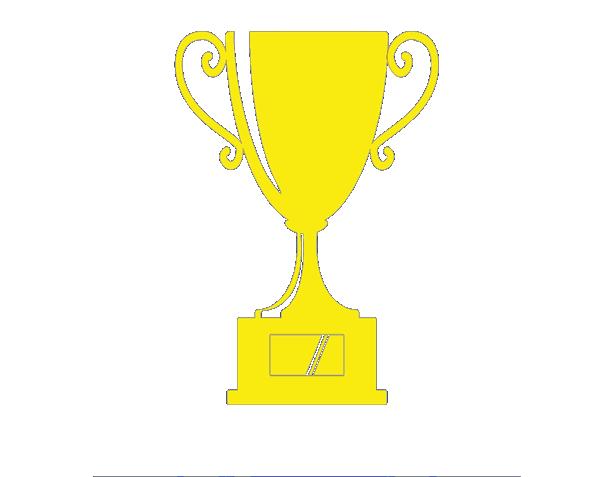
Rand McNally product
Prefix with sphere

Bridle part
Cheese in a ball
Endangered goose
Play __ it lies Cast a ballot
Buffalo's lake
"Casablanca" pianist
28. Riviera season
29. San Diego baseballer
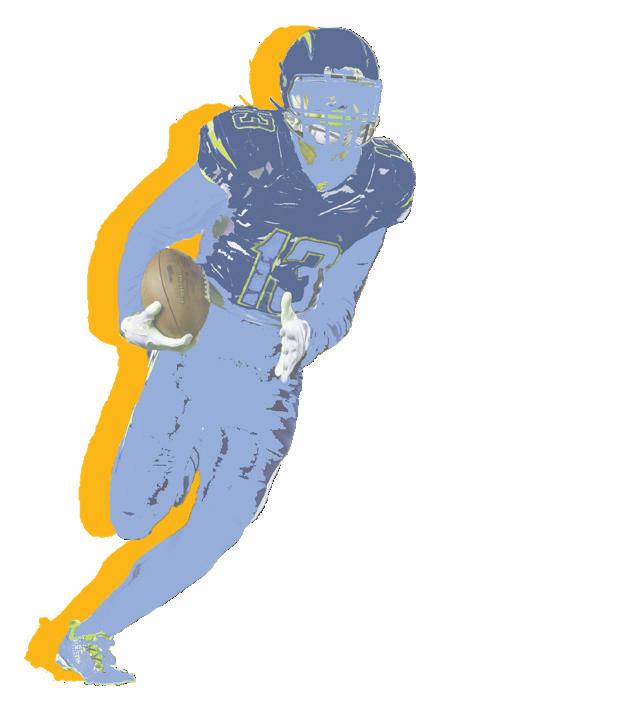
30. Diminutive suffix
"All Things Considered" airer; the first syllables of the long entries provide a clue
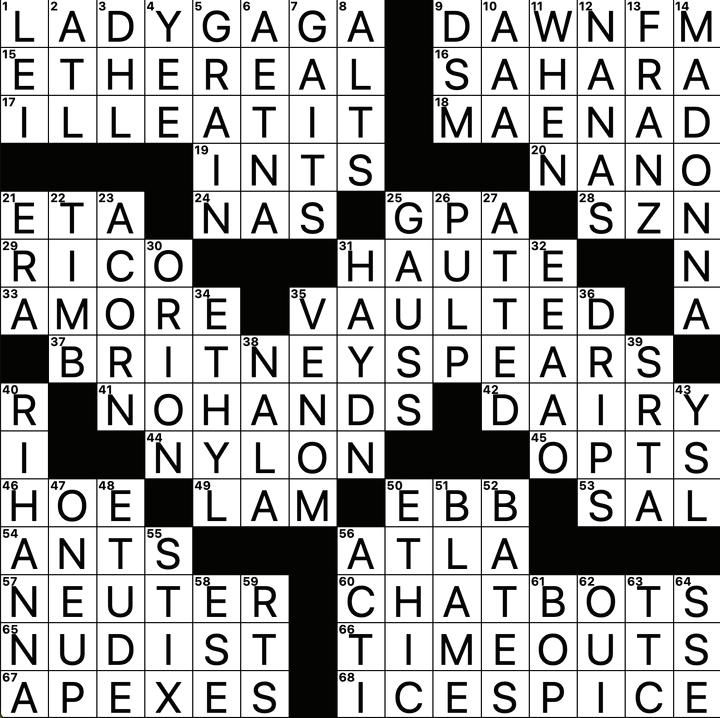
SEPTEMBER 26, 2023 TUESDAY | GAMES | 16
Vaudeville
Mars, to the Greeks 18. Huck Finn’s conveyance 19. Sailor’s “Halt!” 20. “That’s ___” : 1974 MGM film celebrating the studio’s 50th anniversary 23. Make stuff up 24. Crew member 25. Ebb 29. Favorite 31. Exxon, once 1. Jacuzzi 2. Aesop’s race entrant 3. Bakery fixture 4. Left on a map 5. 1976 title role for Sissy Spacek 6. Egg-shaped 7. Comfy spot 8. Pro’s opposite 9. Pulitzer Prize category 10. Patriot Paul of the midnight ride 11. ___ the Terrible 12. Unholy craving 13. Court do-over 21. Graybeards 35. Blue bloods 36. Louis Armstrong nickname 38. Place of honor for a VIP: abbr. 39. Prokofiev’s “symphonic fairy tale for children” 42. Chemical suffix 43. Shopper’s destination 44. Hit the road 45. Old Western Shane star 47. Sheep girlboss 48. Sauntered 49. Hopped-up brewery offering 51. Amazement 52. Quarrelsome
25.
26. Ubyssey culture editor Massing 27. Used as an example 28. Riviera season 29. San Diego baseballer 30. Diminutive suffix 32. Sand bar 33. Work out 34. Rubbed out, gangster style 36. Winter forecast 37. Protective gear 40. Special forces unit 41. Part of WWW 46. Reader’s ___ 59. Beef on the hoof 60. Sandwich shop 61. Conflicted 63. Not quite right 64. Biol. subject 65. Abbr., form to request Government of Canada documents 66. ___ Carlo 67. Difficult situation 68. Clairvoyant 48. Expects; anticipates 50. Prize money 51. The weight of the world’s on his shoulders? 52. Prefix with sphere 53. Bridle part 54. Cheese in a ball 55. Endangered goose 56. Play __ it lies 57. Cast a ballot 58. Buffalo’s lake 59. Toucan ___ 62. Tiny Desk Concert airer; the first syllables of the long entries provide a clue
ACROSS DOWN 1 2 3 4 5 6 7 8 9 10 11 12 13 14 15 16 17 18 19 20 21 22 23 24 25 26 27 28 29 30 31 32 33 34 35 36 37 38 39 40 41 42 43 44 45 46 47 48 49 50 51 52 53 54 55 56 57 58 59 60 61 62 63 64 65 66 67 68 cosmetics production Greeks conveyance MGM studio's nickname VIP:
destination brewery
1. Display 5. ___ Nostra 9. Marching practice 14. Do roadwork 15. Big name in cosmetics 16.
production 17.
22. Tally mark
Ward off
CROSSWORD PUZZLE
"symphonic
BestCrosswords.com - "News Radio"
Vaughan on 6/30/2023 For personal use only. Not for publication. COURTESY
COURTESY KRAZYDAD.COM SUDOKU COURTESY KRAZYDAD.COM CROSSWORD SOLUTION SEPTEMBER 12, 2023 VOLUME CV | ISSUE VI
LEAD
TO VICTORY! COURTESY MAZEGENERATOR.NET
by Allen
BESTCROSSWORDS.COM
MAZE —
THE THUNDERBIRDS



























 Iman Janmohamed Features Editor
Iman Janmohamed Features Editor



 Akanksha Pahargarh Contributor
Akanksha Pahargarh Contributor


































 Stella Griffin
Staff Writer
Stella Griffin
Staff Writer









